? ? ? 首先你需要安装Apache Server,这里以当前最新版Apache Server2.4为例进行说明,可惜官网并没有提供最新版的msi安装包,连编译后的binary二进制压缩包都没提供,不过我已经编译并上传到我的百度网盘,下载地址如下:
? ? ? Apache Server2.4最新版安装包
?
下载下来后直接解压到任意目录,如图: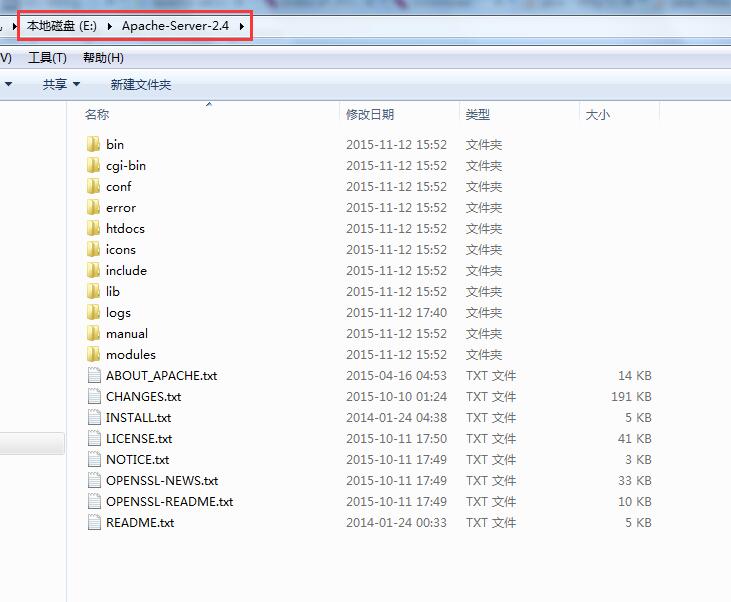
?然后你需要安装Apache Server系统服务,先cd 到apacher server2.4/bin下,然后执行如下命令:
class="java" name="code">httpd.exe -k install -n "Apache Server2.4"
?其中最后的Apache Server2.4为系统服务名称,执行完成后你的系统服务列表会多出一个Apache Server2.4这项服务,如图: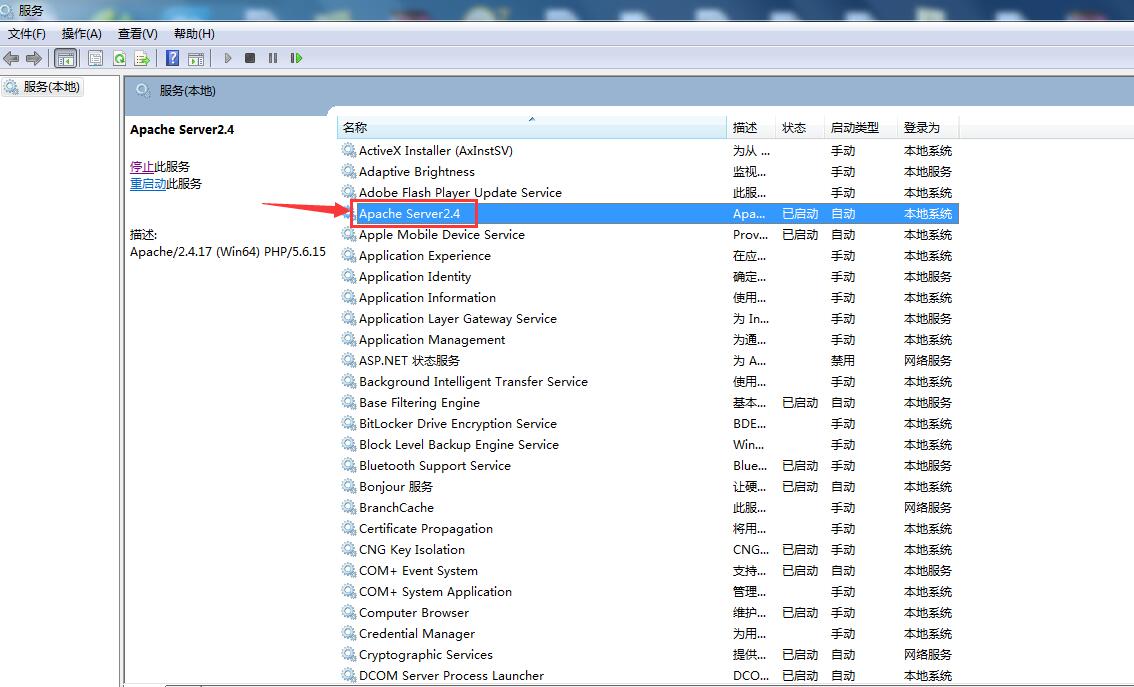
?这样我们就能从系服务列表里启动Apache Server了,而不是直接去执行httpd.exe来启动Apache Server服务了。然后我们需要对Apache Server进行配置,打开E:\Apache-Server-2.4\conf下的httpd.conf配置文件,如图: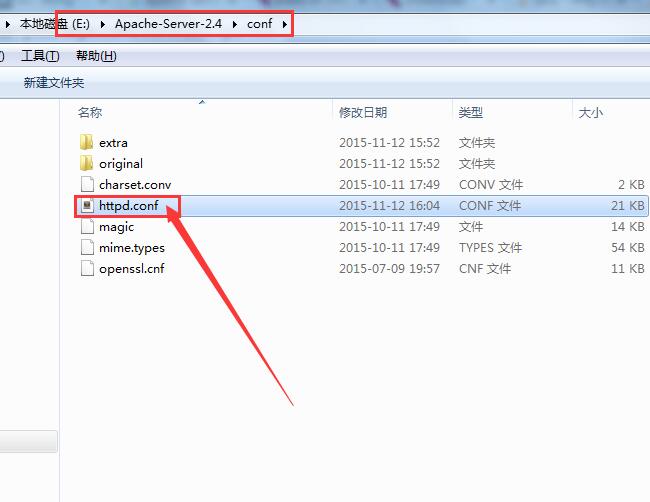
?主要配置项如下:
ServerRoot "E:/Apache-Server-2.4"
Listen 80
ServerAdmin 736031305@qq.com
ServerName www.yida.com
<Directory />
AllowOverride none
Require all denied
</Directory>
<Directory "E:/Apache-Server-2.4/htdocs">
</Directory>
DocumentRoot "E:/Apacher-Server2.4/www"
<Directory "E:/Apacher-Server2.4/www">
</Directory>
ErrorLog "logs/error.log"
<Directory "E:/Apache-Server-2.4/cgi-bin">
</Directory>
?ServerRoot:即我们安装的Apache Server服务器的安装根目录,这里我是直接解压到E:/Apache-Server-2.4下,你懂的。
?
?
Listen:表示Apache Server默认监听的端口号
ServerAdmin:表示配置Apacher Server服务器管理员的Email地址
?
ServerName:即服务名称,一般指定为域名+端口号,如果你没有域名就指定为IP + 端口号,如果端口号为80,则端口号可以省略
?
DocumentRoot:配置你的服务器站点根目录,这里我是配置为E:/Apacher-Server2.4/www,即你编写的网站代码文件都存放在此目录下,就好比Tomcat下的webapps目录,这样说你们可能会比较好理解,站点目录你们随便自定义哈,不一定要跟我一样,你设置为D:\aaaa\bbbb都行,如图: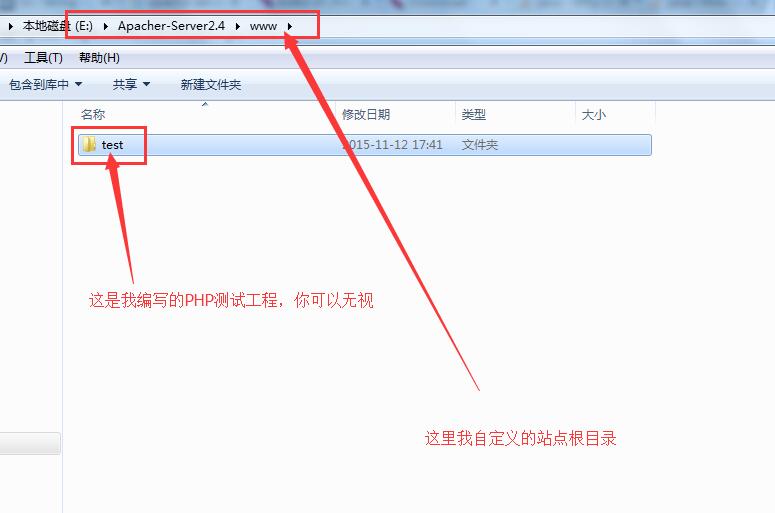
?
?
<Directory />:这里即配置上面DocumentRoot设置的站点根目录的访问权限
?
<Directory "E:/Apache-Server-2.4/htdocs">:即配置Apache Server安装目录下的htdocs的访问权限,如图: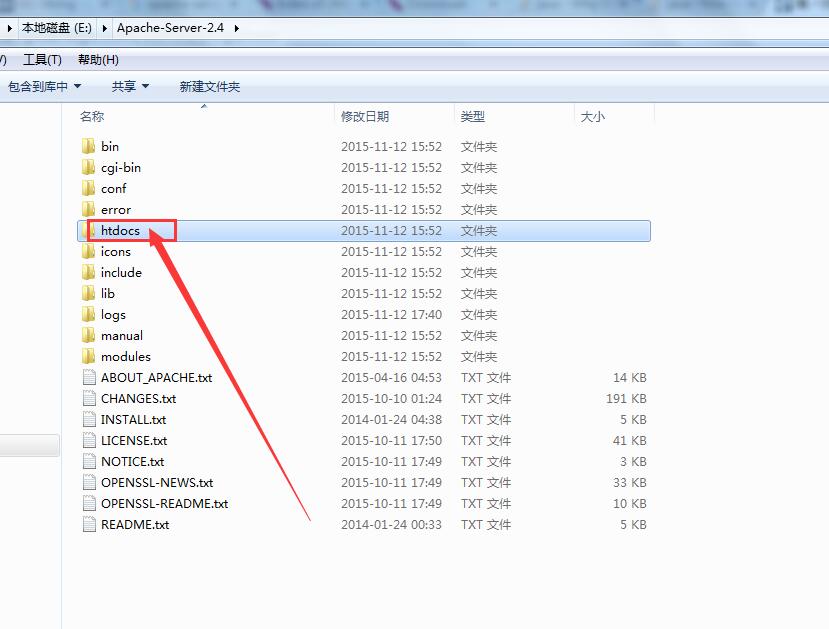
?<Directory "E:/Apacher-Server2.4/www">:即配置我们的站点根目录的访问权限
?
ErrorLog:即配置Apache Server服务器的日志文件存放目录,如果我们的Apache Server启动失败的时候,我们就可以去这个目录下查看服务器日志,从而排查异常。
?
修改完如上配置请重启我们的Apache Server使其生效,你可以点击E:\Apache-Server-2.4\bin下的ApacheMonitor.exe打开Apache Server管理界面来重启服务器,也可以通过系统服务列表里找到Apache Server2.4系统服务并重启它,具体操作如图: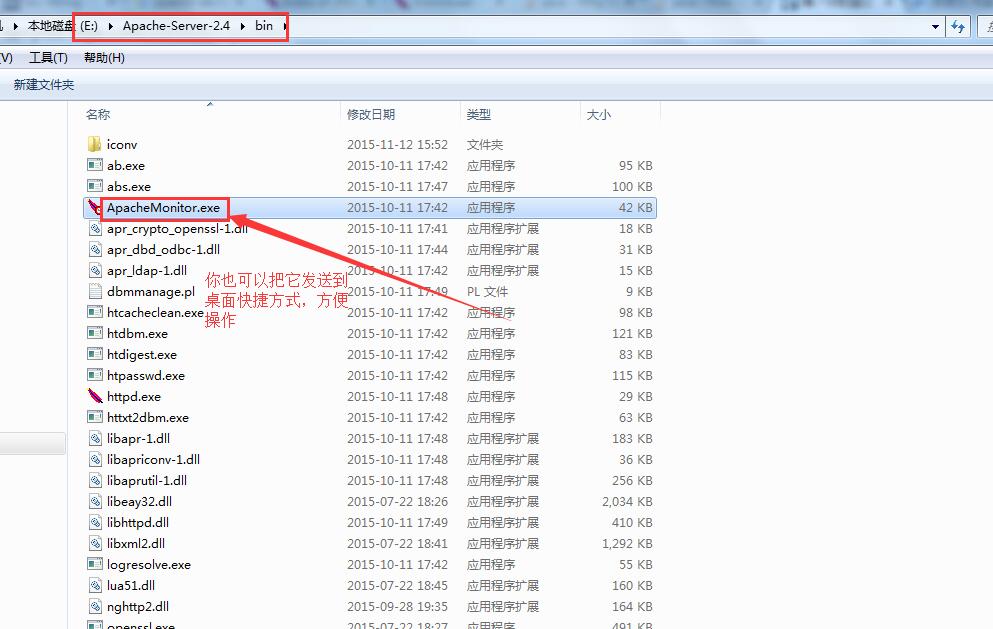
?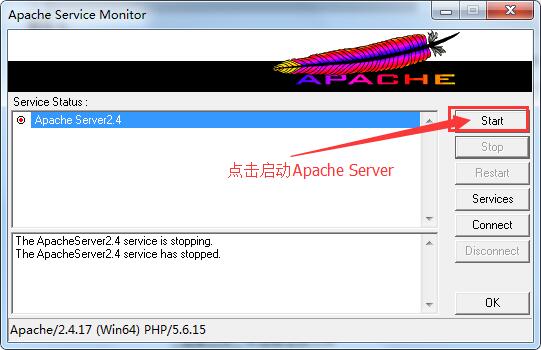
?启动之前,请确保你的Apache Server2.4系统服务已经启动,如图: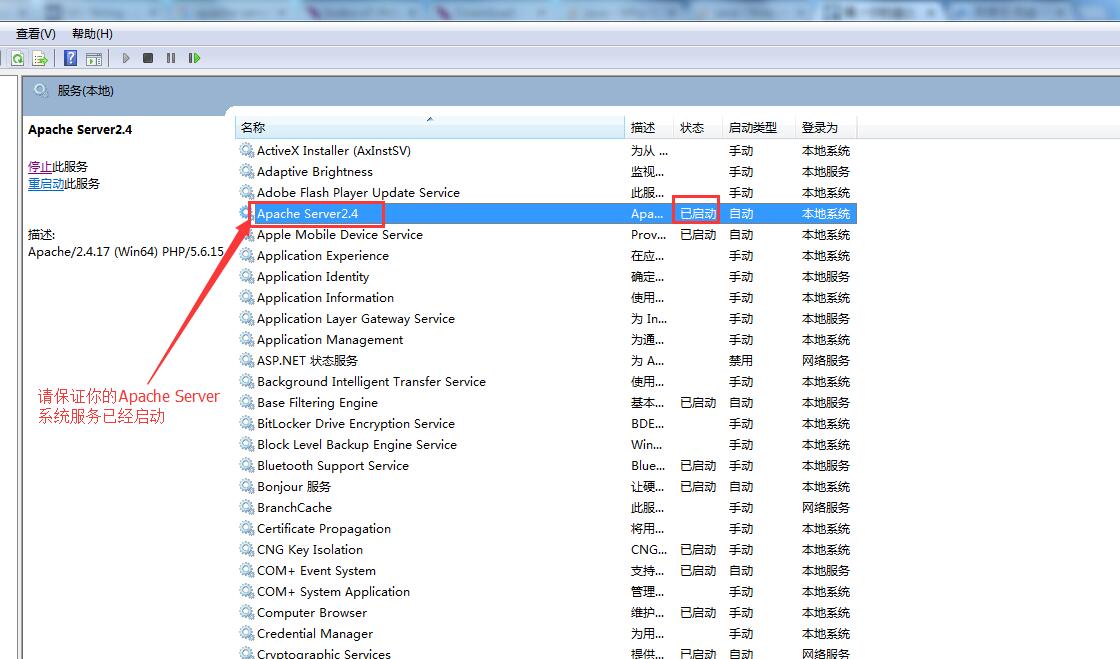
?这样我们的Apache Server就已经安装好了,打开浏览器地址栏里输入http://localhost,测试是否能正常访问而不是提示异常,则表明Apache Server安装成功了,如图:
?如果你看到如上图的“It works!”信息,则表明Apache Server已经安装成功了!
?
接着你需要安装PHP,请如图操作: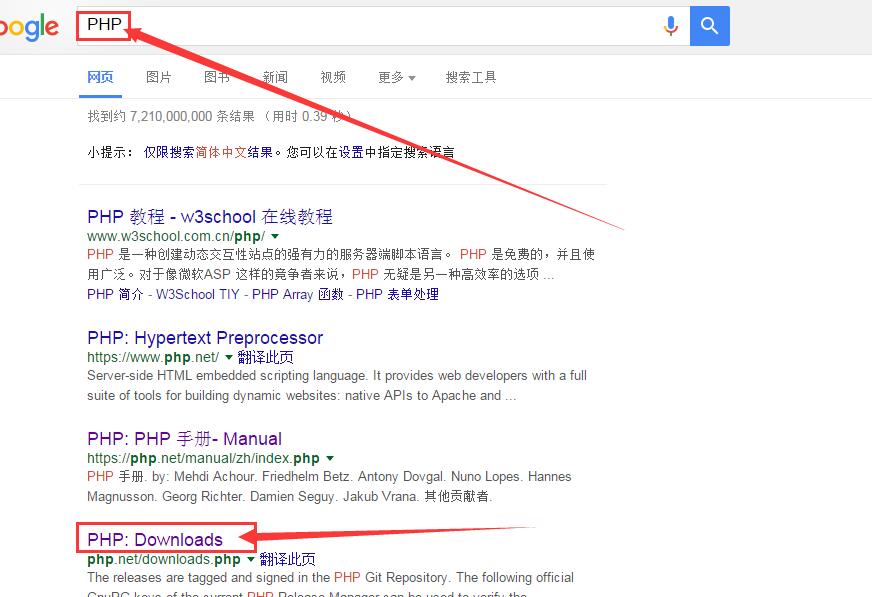
?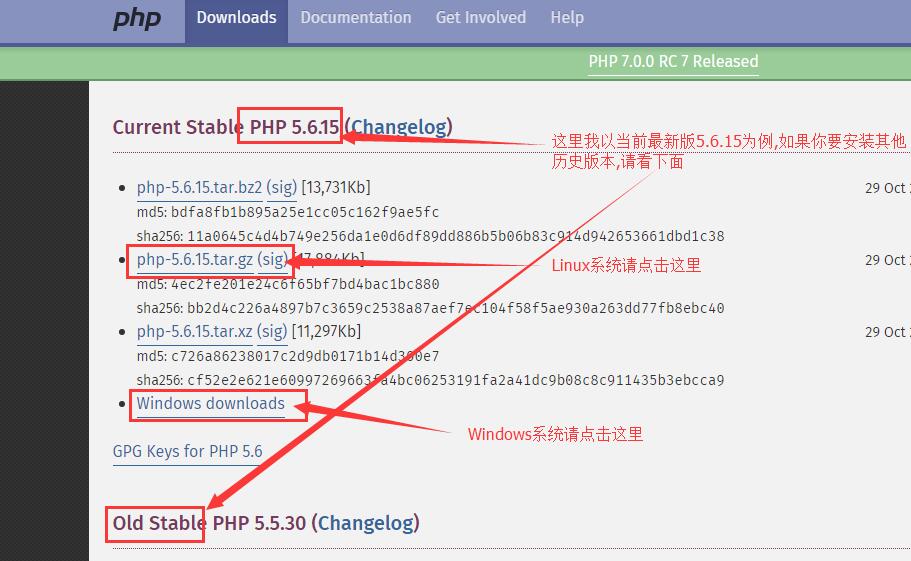
?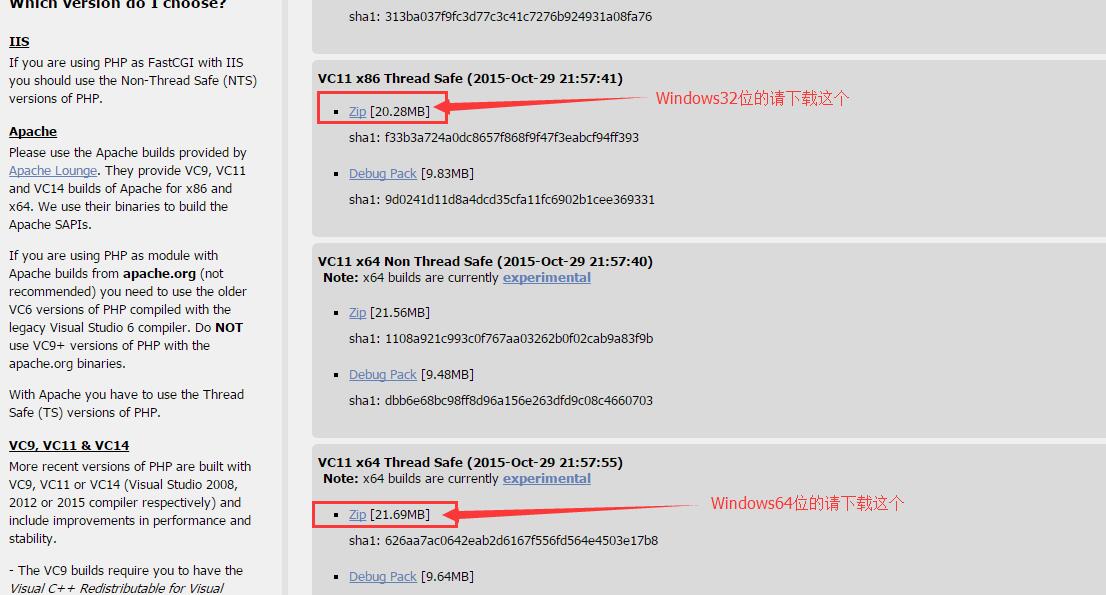
?下载完后请解压到任意目录,如图: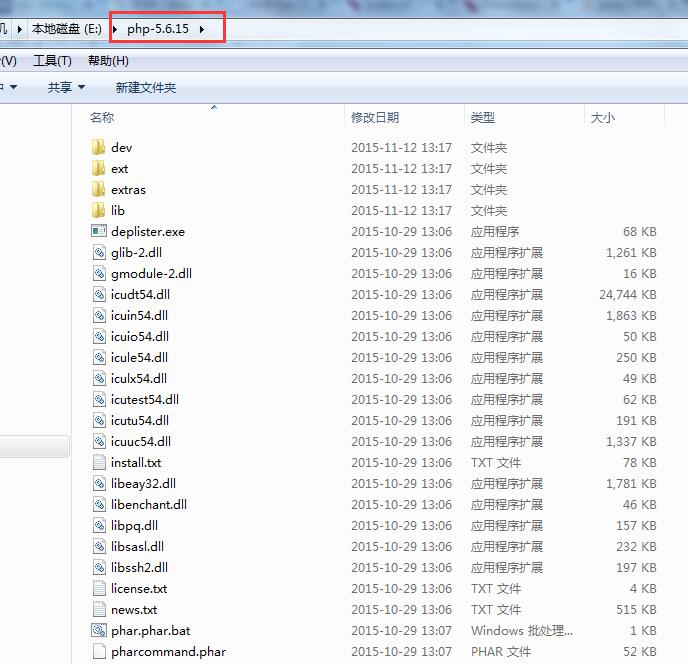
?这里E:\php-5.6.15就是我的PHP安装根目录,你们自己随便哈,你懂的!然后我们需要为PHP配置环境变量,如图操作:?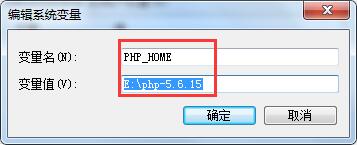
?然后选中path系统变量,然后点击编辑,如图: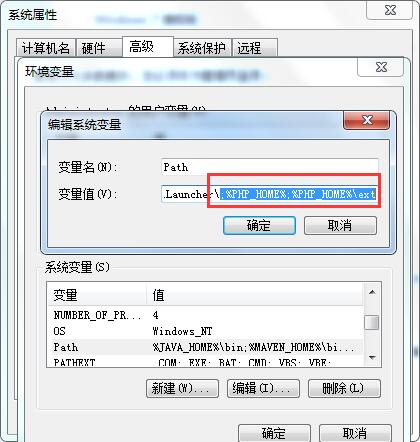
?在path系统变量的最末尾追加如下一段配置内容:
;%PHP_HOME%;%PHP_HOME%\ext
为了引起你们的注意,特意把开头的分号用红色大字体标识了,千万不要少了最前面的那个分号哈!特此提醒!
?
然后回到我们的PHP安装根目录E:\php-5.6.15下,如图操作: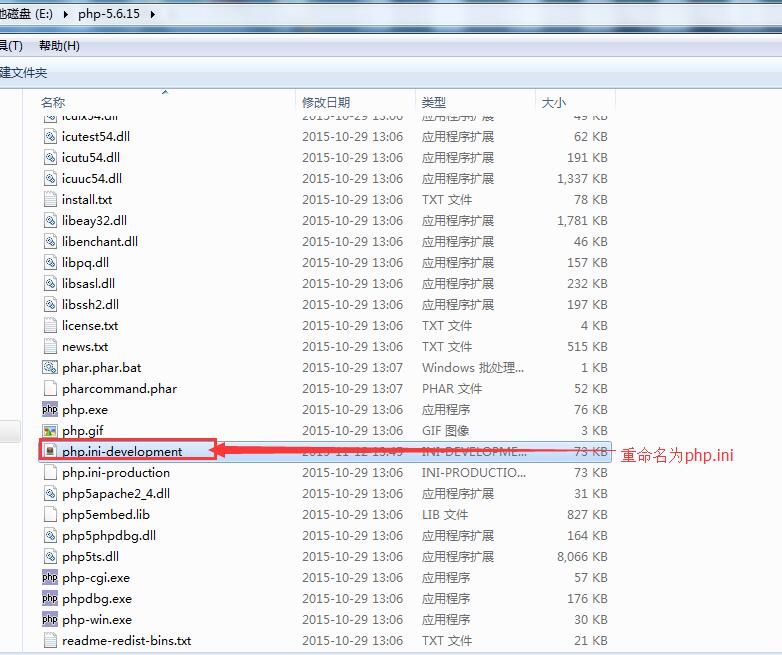
?然后用你喜欢的文本编辑软件对php.ini配置文件进行编辑,主要修改的地方如下:
memory_limit = 256M default_mimetype = "text/html" default_charset = "UTF-8" extension=php_mysql.dll date.timezone = Asia/Shanghai mysql.default_port = 3306 mysql.default_user = root
?memory_linit:配置你的PHP的最大占用内存,这里我加大到256M,防止PHP进程出现内存溢出
default_mimetype:设置默认的MIME类型为text/html,即默认会当作html文件来解析处理
default_charset:配置PHP的默认编码为UTF-8,这个配置很重要,可以避免很多情况下的乱码问题,务必要对此项进行检查
extension:mysql.dll:此项表示开启对MySQL的支持
date.timezone:配置PHP里日期的默认时区为上海时区,这项配置也很重要,可以避免很多日期格式化问题,默认为UTC时区
mysql.default_port:即Mysql数据库的默认端口,不设置默认也为3306,
mysql.default_user:即Mysql数据库的默认登录帐号,不设置默认也为root
下面贴下我的php.ini完整配置,方便你们参照:
[PHP] ;;;;;;;;;;;;;;;;;;; ; About php.ini ; ;;;;;;;;;;;;;;;;;;; ; PHP's initialization file, generally called php.ini, is responsible for ; configuring many of the aspects of PHP's behavior. ; PHP attempts to find and load this configuration from a number of locations. ; The following is a summary of its search order: ; 1. SAPI module specific location. ; 2. The PHPRC environment variable. (As of PHP 5.2.0) ; 3. A number of predefined registry keys on Windows (As of PHP 5.2.0) ; 4. Current working directory (except CLI) ; 5. The web server's directory (for SAPI modules), or directory of PHP ; (otherwise in Windows) ; 6. The directory from the --with-config-file-path compile time option, or the ; Windows directory (C:\windows or C:\winnt) ; See the PHP docs for more specific information. ; http://php.net/configuration.file ; The syntax of the file is extremely simple. Whitespace and lines ; beginning with a semicolon are silently ignored (as you probably guessed). ; Section headers (e.g. [Foo]) are also silently ignored, even though ; they might mean something in the future. ; Directives following the section heading [PATH=/www/mysite] only ; apply to PHP files in the /www/mysite directory. Directives ; following the section heading [HOST=www.example.com] only apply to ; PHP files served from www.example.com. Directives set in these ; special sections cannot be overridden by user-defined INI files or ; at runtime. Currently, [PATH=] and [HOST=] sections only work under ; CGI/FastCGI. ; http://php.net/ini.sections ; Directives are specified using the following syntax: ; directive = value ; Directive names are *case sensitive* - foo=bar is different from FOO=bar. ; Directives are variables used to configure PHP or PHP extensions. ; There is no name validation. If PHP can't find an expected ; directive because it is not set or is mistyped, a default value will be used. ; The value can be a string, a number, a PHP constant (e.g. E_ALL or M_PI), one ; of the INI constants (On, Off, True, False, Yes, No and None) or an expression ; (e.g. E_ALL & ~E_NOTICE), a quoted string ("bar"), or a reference to a ; previously set variable or directive (e.g. ${foo}) ; Expressions in the INI file are limited to bitwise operators and parentheses: ; | bitwise OR ; ^ bitwise XOR ; & bitwise AND ; ~ bitwise NOT ; ! boolean NOT ; Boolean flags can be turned on using the values 1, On, True or Yes. ; They can be turned off using the values 0, Off, False or No. ; An empty string can be denoted by simply not writing anything after the equal ; sign, or by using the None keyword: ; foo = ; sets foo to an empty string ; foo = None ; sets foo to an empty string ; foo = "None" ; sets foo to the string 'None' ; If you use constants in your value, and these constants belong to a ; dynamically loaded extension (either a PHP extension or a Zend extension), ; you may only use these constants *after* the line that loads the extension. ;;;;;;;;;;;;;;;;;;; ; About this file ; ;;;;;;;;;;;;;;;;;;; ; PHP comes packaged with two INI files. One that is recommended to be used ; in production environments and one that is recommended to be used in ; development environments. ; php.ini-production contains settings which hold security, performance and ; best practices at its core. But please be aware, these settings may break ; compatibility with older or less security conscience applications. We ; recommending using the production ini in production and testing environments. ; php.ini-development is very similar to its production variant, except it is ; much more verbose when it comes to errors. We recommend using the ; development version only in development environments, as errors shown to ; application users can inadvertently leak otherwise secure information. ; This is php.ini-development INI file. ;;;;;;;;;;;;;;;;;;; ; Quick Reference ; ;;;;;;;;;;;;;;;;;;; ; The following are all the settings which are different in either the production ; or development versions of the INIs with respect to PHP's default behavior. ; Please see the actual settings later in the document for more details as to why ; we recommend these changes in PHP's behavior. ; display_errors ; Default Value: On ; Development Value: On ; Production Value: Off ; display_startup_errors ; Default Value: Off ; Development Value: On ; Production Value: Off ; error_reporting ; Default Value: E_ALL & ~E_NOTICE & ~E_STRICT & ~E_DEPRECATED ; Development Value: E_ALL ; Production Value: E_ALL & ~E_DEPRECATED & ~E_STRICT ; html_errors ; Default Value: On ; Development Value: On ; Production value: On ; log_errors ; Default Value: Off ; Development Value: On ; Production Value: On ; max_input_time ; Default Value: -1 (Unlimited) ; Development Value: 60 (60 seconds) ; Production Value: 60 (60 seconds) ; output_buffering ; Default Value: Off ; Development Value: 4096 ; Production Value: 4096 ; register_argc_argv ; Default Value: On ; Development Value: Off ; Production Value: Off ; request_order ; Default Value: None ; Development Value: "GP" ; Production Value: "GP" ; session.gc_divisor ; Default Value: 100 ; Development Value: 1000 ; Production Value: 1000 ; session.hash_bits_per_character ; Default Value: 4 ; Development Value: 5 ; Production Value: 5 ; short_open_tag ; Default Value: On ; Development Value: Off ; Production Value: Off ; track_errors ; Default Value: Off ; Development Value: On ; Production Value: Off ; url_rewriter.tags ; Default Value: "a=href,area=href,frame=src,form=,fieldset=" ; Development Value: "a=href,area=href,frame=src,input=src,form=fakeentry" ; Production Value: "a=href,area=href,frame=src,input=src,form=fakeentry" ; variables_order ; Default Value: "EGPCS" ; Development Value: "GPCS" ; Production Value: "GPCS" ;;;;;;;;;;;;;;;;;;;; ; php.ini Options ; ;;;;;;;;;;;;;;;;;;;; ; Name for user-defined php.ini (.htaccess) files. Default is ".user.ini" ;user_ini.filename = ".user.ini" ; To disable this feature set this option to empty value ;user_ini.filename = ; TTL for user-defined php.ini files (time-to-live) in seconds. Default is 300 seconds (5 minutes) ;user_ini.cache_ttl = 300 ;;;;;;;;;;;;;;;;;;;; ; Language Options ; ;;;;;;;;;;;;;;;;;;;; ; Enable the PHP scripting language engine under Apache. ; http://php.net/engine engine = On ; This directive determines whether or not PHP will recognize code between ; <? and ?> tags as PHP source which should be processed as such. It is ; generally recommended that <?php and ?> should be used and that this feature ; should be disabled, as enabling it may result in issues when generating XML ; documents, however this remains supported for backward compatibility reasons. ; Note that this directive does not control the <?= shorthand tag, which can be ; used regardless of this directive. ; Default Value: On ; Development Value: Off ; Production Value: Off ; http://php.net/short-open-tag short_open_tag = Off ; Allow ASP-style <% %> tags. ; http://php.net/asp-tags asp_tags = Off ; The number of significant digits displayed in floating point numbers. ; http://php.net/precision precision = 14 ; Output buffering is a mechanism for controlling how much output data ; (excluding headers and cookies) PHP should keep internally before pushing that ; data to the client. If your application's output exceeds this setting, PHP ; will send that data in chunks of roughly the size you specify. ; Turning on this setting and managing its maximum buffer size can yield some ; interesting side-effects depending on your application and web server. ; You may be able to send headers and cookies after you've already sent output ; through print or echo. You also may see performance benefits if your server is ; emitting less packets due to buffered output versus PHP streaming the output ; as it gets it. On production servers, 4096 bytes is a good setting for performance ; reasons. ; Note: Output buffering can also be controlled via Output Buffering Control ; functions. ; Possible Values: ; On = Enabled and buffer is unlimited. (Use with caution) ; Off = Disabled ; Integer = Enables the buffer and sets its maximum size in bytes. ; Note: This directive is hardcoded to Off for the CLI SAPI ; Default Value: Off ; Development Value: 4096 ; Production Value: 4096 ; http://php.net/output-buffering output_buffering = 4096 ; You can redirect all of the output of your scripts to a function. For ; example, if you set output_handler to "mb_output_handler", character ; encoding will be transparently converted to the specified encoding. ; Setting any output handler automatically turns on output buffering. ; Note: People who wrote portable scripts should not depend on this ini ; directive. Instead, explicitly set the output handler using ob_start(). ; Using this ini directive may cause problems unless you know what script ; is doing. ; Note: You cannot use both "mb_output_handler" with "ob_iconv_handler" ; and you cannot use both "ob_gzhandler" and "zlib.output_compression". ; Note: output_handler must be empty if this is set 'On' !!!! ; Instead you must use zlib.output_handler. ; http://php.net/output-handler ;output_handler = ; Transparent output compression using the zlib library ; Valid values for this option are 'off', 'on', or a specific buffer size ; to be used for compression (default is 4KB) ; Note: Resulting chunk size may vary due to nature of compression. PHP ; outputs chunks that are few hundreds bytes each as a result of ; compression. If you prefer a larger chunk size for better ; performance, enable output_buffering in addition. ; Note: You need to use zlib.output_handler instead of the standard ; output_handler, or otherwise the output will be corrupted. ; http://php.net/zlib.output-compression zlib.output_compression = Off ; http://php.net/zlib.output-compression-level ;zlib.output_compression_level = -1 ; You cannot specify additional output handlers if zlib.output_compression ; is activated here. This setting does the same as output_handler but in ; a different order. ; http://php.net/zlib.output-handler ;zlib.output_handler = ; Implicit flush tells PHP to tell the output layer to flush itself ; automatically after every output block. This is equivalent to calling the ; PHP function flush() after each and every call to print() or echo() and each ; and every HTML block. Turning this option on has serious performance ; implications and is generally recommended for debugging purposes only. ; http://php.net/implicit-flush ; Note: This directive is hardcoded to On for the CLI SAPI implicit_flush = Off ; The unserialize callback function will be called (with the undefined class' ; name as parameter), if the unserializer finds an undefined class ; which should be instantiated. A warning appears if the specified function is ; not defined, or if the function doesn't include/implement the missing class. ; So only set this entry, if you really want to implement such a ; callback-function. unserialize_callback_func = ; When floats & doubles are serialized store serialize_precision significant ; digits after the floating point. The default value ensures that when floats ; are decoded with unserialize, the data will remain the same. serialize_precision = 17 ; open_basedir, if set, limits all file operations to the defined directory ; and below. This directive makes most sense if used in a per-directory ; or per-virtualhost web server configuration file. ; http://php.net/open-basedir ;open_basedir = ; This directive allows you to disable certain functions for security reasons. ; It receives a comma-delimited list of function names. ; http://php.net/disable-functions disable_functions = ; This directive allows you to disable certain classes for security reasons. ; It receives a comma-delimited list of class names. ; http://php.net/disable-classes disable_classes = ; Colors for Syntax Highlighting mode. Anything that's acceptable in ; <span style="color: ???????"> would work. ; http://php.net/syntax-highlighting ;highlight.string = #DD0000 ;highlight.comment = #FF9900 ;highlight.keyword = #007700 ;highlight.default = #0000BB ;highlight.html = #000000 ; If enabled, the request will be allowed to complete even if the user aborts ; the request. Consider enabling it if executing long requests, which may end up ; being interrupted by the user or a browser timing out. PHP's default behavior ; is to disable this feature. ; http://php.net/ignore-user-abort ;ignore_user_abort = On ; Determines the size of the realpath cache to be used by PHP. This value should ; be increased on systems where PHP opens many files to reflect the quantity of ; the file operations performed. ; http://php.net/realpath-cache-size ;realpath_cache_size = 16k ; Duration of time, in seconds for which to cache realpath information for a given ; file or directory. For systems with rarely changing files, consider increasing this ; value. ; http://php.net/realpath-cache-ttl ;realpath_cache_ttl = 120 ; Enables or disables the circular reference collector. ; http://php.net/zend.enable-gc zend.enable_gc = On ; If enabled, scripts may be written in encodings that are incompatible with ; the scanner. CP936, Big5, CP949 and Shift_JIS are the examples of such ; encodings. To use this feature, mbstring extension must be enabled. ; Default: Off ;zend.multibyte = Off ; Allows to set the default encoding for the scripts. This value will be used ; unless "declare(encoding=...)" directive appears at the top of the script. ; Only affects if zend.multibyte is set. ; Default: "" ;zend.script_encoding = ;;;;;;;;;;;;;;;;; ; Miscellaneous ; ;;;;;;;;;;;;;;;;; ; Decides whether PHP may expose the fact that it is installed on the server ; (e.g. by adding its signature to the Web server header). It is no security ; threat in any way, but it makes it possible to determine whether you use PHP ; on your server or not. ; http://php.net/expose-php expose_php = On ;;;;;;;;;;;;;;;;;;; ; Resource Limits ; ;;;;;;;;;;;;;;;;;;; ; Maximum execution time of each script, in seconds ; http://php.net/max-execution-time ; Note: This directive is hardcoded to 0 for the CLI SAPI max_execution_time = 30 ; Maximum amount of time each script may spend parsing request data. It's a good ; idea to limit this time on productions servers in order to eliminate unexpectedly ; long running scripts. ; Note: This directive is hardcoded to -1 for the CLI SAPI ; Default Value: -1 (Unlimited) ; Development Value: 60 (60 seconds) ; Production Value: 60 (60 seconds) ; http://php.net/max-input-time max_input_time = 60 ; Maximum input variable nesting level ; http://php.net/max-input-nesting-level ;max_input_nesting_level = 64 ; How many GET/POST/COOKIE input variables may be accepted ; max_input_vars = 1000 ; Maximum amount of memory a script may consume (128MB) ; http://php.net/memory-limit memory_limit = 128M ;;;;;;;;;;;;;;;;;;;;;;;;;;;;;; ; Error handling and logging ; ;;;;;;;;;;;;;;;;;;;;;;;;;;;;;; ; This directive informs PHP of which errors, warnings and notices you would like ; it to take action for. The recommended way of setting values for this ; directive is through the use of the error level constants and bitwise ; operators. The error level constants are below here for convenience as well as ; some common settings and their meanings. ; By default, PHP is set to take action on all errors, notices and warnings EXCEPT ; those related to E_NOTICE and E_STRICT, which together cover best practices and ; recommended coding standards in PHP. For performance reasons, this is the ; recommend error reporting setting. Your production server shouldn't be wasting ; resources complaining about best practices and coding standards. That's what ; development servers and development settings are for. ; Note: The php.ini-development file has this setting as E_ALL. This ; means it pretty much reports everything which is exactly what you want during ; development and early testing. ; ; Error Level Constants: ; E_ALL - All errors and warnings (includes E_STRICT as of PHP 5.4.0) ; E_ERROR - fatal run-time errors ; E_RECOVERABLE_ERROR - almost fatal run-time errors ; E_WARNING - run-time warnings (non-fatal errors) ; E_PARSE - compile-time parse errors ; E_NOTICE - run-time notices (these are warnings which often result ; from a bug in your code, but it's possible that it was ; intentional (e.g., using an uninitialized variable and ; relying on the fact it is automatically initialized to an ; empty string) ; E_STRICT - run-time notices, enable to have PHP suggest changes ; to your code which will ensure the best interoperability ; and forward compatibility of your code ; E_CORE_ERROR - fatal errors that occur during PHP's initial startup ; E_CORE_WARNING - warnings (non-fatal errors) that occur during PHP's ; initial startup ; E_COMPILE_ERROR - fatal compile-time errors ; E_COMPILE_WARNING - compile-time warnings (non-fatal errors) ; E_USER_ERROR - user-generated error message ; E_USER_WARNING - user-generated warning message ; E_USER_NOTICE - user-generated notice message ; E_DEPRECATED - warn about code that will not work in future versions ; of PHP ; E_USER_DEPRECATED - user-generated deprecation warnings ; ; Common Values: ; E_ALL (Show all errors, warnings and notices including coding standards.) ; E_ALL & ~E_NOTICE (Show all errors, except for notices) ; E_ALL & ~E_NOTICE & ~E_STRICT (Show all errors, except for notices and coding standards warnings.) ; E_COMPILE_ERROR|E_RECOVERABLE_ERROR|E_ERROR|E_CORE_ERROR (Show only errors) ; Default Value: E_ALL & ~E_NOTICE & ~E_STRICT & ~E_DEPRECATED ; Development Value: E_ALL ; Production Value: E_ALL & ~E_DEPRECATED & ~E_STRICT ; http://php.net/error-reporting error_reporting = E_ALL ; This directive controls whether or not and where PHP will output errors, ; notices and warnings too. Error output is very useful during development, but ; it could be very dangerous in production environments. Depending on the code ; which is triggering the error, sensitive information could potentially leak ; out of your application such as database usernames and passwords or worse. ; For production environments, we recommend logging errors rather than ; sending them to STDOUT. ; Possible Values: ; Off = Do not display any errors ; stderr = Display errors to STDERR (affects only CGI/CLI binaries!) ; On or stdout = Display errors to STDOUT ; Default Value: On ; Development Value: On ; Production Value: Off ; http://php.net/display-errors display_errors = On ; The display of errors which occur during PHP's startup sequence are handled ; separately from display_errors. PHP's default behavior is to suppress those ; errors from clients. Turning the display of startup errors on can be useful in ; debugging configuration problems. We strongly recommend you ; set this to 'off' for production servers. ; Default Value: Off ; Development Value: On ; Production Value: Off ; http://php.net/display-startup-errors display_startup_errors = On ; Besides displaying errors, PHP can also log errors to locations such as a ; server-specific log, STDERR, or a location specified by the error_log ; directive found below. While errors should not be displayed on productions ; servers they should still be monitored and logging is a great way to do that. ; Default Value: Off ; Development Value: On ; Production Value: On ; http://php.net/log-errors log_errors = On ; Set maximum length of log_errors. In error_log information about the source is ; added. The default is 1024 and 0 allows to not apply any maximum length at all. ; http://php.net/log-errors-max-len log_errors_max_len = 1024 ; Do not log repeated messages. Repeated errors must occur in same file on same ; line unless ignore_repeated_source is set true. ; http://php.net/ignore-repeated-errors ignore_repeated_errors = Off ; Ignore source of message when ignoring repeated messages. When this setting ; is On you will not log errors with repeated messages from different files or ; source lines. ; http://php.net/ignore-repeated-source ignore_repeated_source = Off ; If this parameter is set to Off, then memory leaks will not be shown (on ; stdout or in the log). This has only effect in a debug compile, and if ; error reporting includes E_WARNING in the allowed list ; http://php.net/report-memleaks report_memleaks = On ; This setting is on by default. ;report_zend_debug = 0 ; Store the last error/warning message in $php_errormsg (boolean). Setting this value ; to On can assist in debugging and is appropriate for development servers. It should ; however be disabled on production servers. ; Default Value: Off ; Development Value: On ; Production Value: Off ; http://php.net/track-errors track_errors = On ; Turn off normal error reporting and emit XML-RPC error XML ; http://php.net/xmlrpc-errors ;xmlrpc_errors = 0 ; An XML-RPC faultCode ;xmlrpc_error_number = 0 ; When PHP displays or logs an error, it has the capability of formatting the ; error message as HTML for easier reading. This directive controls whether ; the error message is formatted as HTML or not. ; Note: This directive is hardcoded to Off for the CLI SAPI ; Default Value: On ; Development Value: On ; Production value: On ; http://php.net/html-errors html_errors = On ; If html_errors is set to On *and* docref_root is not empty, then PHP ; produces clickable error messages that direct to a page describing the error ; or function causing the error in detail. ; You can download a copy of the PHP manual from http://php.net/docs ; and change docref_root to the base URL of your local copy including the ; leading '/'. You must also specify the file extension being used including ; the dot. PHP's default behavior is to leave these settings empty, in which ; case no links to documentation are generated. ; Note: Never use this feature for production boxes. ; http://php.net/docref-root ; Examples ;docref_root = "/phpmanual/" ; http://php.net/docref-ext ;docref_ext = .html ; String to output before an error message. PHP's default behavior is to leave ; this setting blank. ; http://php.net/error-prepend-string ; Example: ;error_prepend_string = "<span style='color: #ff0000'>" ; String to output after an error message. PHP's default behavior is to leave ; this setting blank. ; http://php.net/error-append-string ; Example: ;error_append_string = "</span>" ; Log errors to specified file. PHP's default behavior is to leave this value ; empty. ; http://php.net/error-log ; Example: ;error_log = php_errors.log ; Log errors to syslog (Event Log on Windows). ;error_log = syslog ;windows.show_crt_warning ; Default value: 0 ; Development value: 0 ; Production value: 0 ;;;;;;;;;;;;;;;;; ; Data Handling ; ;;;;;;;;;;;;;;;;; ; The separator used in PHP generated URLs to separate arguments. ; PHP's default setting is "&". ; http://php.net/arg-separator.output ; Example: ;arg_separator.output = "&" ; List of separator(s) used by PHP to parse input URLs into variables. ; PHP's default setting is "&". ; NOTE: Every character in this directive is considered as separator! ; http://php.net/arg-separator.input ; Example: ;arg_separator.input = ";&" ; This directive determines which super global arrays are registered when PHP ; starts up. G,P,C,E & S are abbreviations for the following respective super ; globals: GET, POST, COOKIE, ENV and SERVER. There is a performance penalty ; paid for the registration of these arrays and because ENV is not as commonly ; used as the others, ENV is not recommended on productions servers. You ; can still get access to the environment variables through getenv() should you ; need to. ; Default Value: "EGPCS" ; Development Value: "GPCS" ; Production Value: "GPCS"; ; http://php.net/variables-order variables_order = "GPCS" ; This directive determines which super global data (G,P & C) should be ; registered into the super global array REQUEST. If so, it also determines ; the order in which that data is registered. The values for this directive ; are specified in the same manner as the variables_order directive, ; EXCEPT one. Leaving this value empty will cause PHP to use the value set ; in the variables_order directive. It does not mean it will leave the super ; globals array REQUEST empty. ; Default Value: None ; Development Value: "GP" ; Production Value: "GP" ; http://php.net/request-order request_order = "GP" ; This directive determines whether PHP registers $argv & $argc each time it ; runs. $argv contains an array of all the arguments passed to PHP when a script ; is invoked. $argc contains an integer representing the number of arguments ; that were passed when the script was invoked. These arrays are extremely ; useful when running scripts from the command line. When this directive is ; enabled, registering these variables consumes CPU cycles and memory each time ; a script is executed. For performance reasons, this feature should be disabled ; on production servers. ; Note: This directive is hardcoded to On for the CLI SAPI ; Default Value: On ; Development Value: Off ; Production Value: Off ; http://php.net/register-argc-argv register_argc_argv = Off ; When enabled, the ENV, REQUEST and SERVER variables are created when they're ; first used (Just In Time) instead of when the script starts. If these ; variables are not used within a script, having this directive on will result ; in a performance gain. The PHP directive register_argc_argv must be disabled ; for this directive to have any affect. ; http://php.net/auto-globals-jit auto_globals_jit = On ; Whether PHP will read the POST data. ; This option is enabled by default. ; Most likely, you won't want to disable this option globally. It causes $_POST ; and $_FILES to always be empty; the only way you will be able to read the ; POST data will be through the php://input stream wrapper. This can be useful ; to proxy requests or to process the POST data in a memory efficient fashion. ; http://php.net/enable-post-data-reading ;enable_post_data_reading = Off ; Maximum size of POST data that PHP will accept. ; Its value may be 0 to disable the limit. It is ignored if POST data reading ; is disabled through enable_post_data_reading. ; http://php.net/post-max-size post_max_size = 8M ; Automatically add files before PHP document. ; http://php.net/auto-prepend-file auto_prepend_file = ; Automatically add files after PHP document. ; http://php.net/auto-append-file auto_append_file = ; By default, PHP will output a character encoding using ; the Content-type: header. To disable sending of the charset, simply ; set it to be empty. ; ; PHP's built-in default is text/html ; http://php.net/default-mimetype default_mimetype = "text/html" ; PHP's default character set is set to UTF-8. ; http://php.net/default-charset default_charset = "UTF-8" ; PHP internal character encoding is set to empty. ; If empty, default_charset is used. ; http://php.net/internal-encoding ;internal_encoding = ; PHP input character encoding is set to empty. ; If empty, default_charset is used. ; http://php.net/input-encoding ;input_encoding = ; PHP output character encoding is set to empty. ; If empty, default_charset is used. ; mbstring or iconv output handler is used. ; See also output_buffer. ; http://php.net/output-encoding ;output_encoding = ; Always populate the $HTTP_RAW_POST_DATA variable. PHP's default behavior is ; to disable this feature and it will be removed in a future version. ; If post reading is disabled through enable_post_data_reading, ; $HTTP_RAW_POST_DATA is *NOT* populated. ; http://php.net/always-populate-raw-post-data ;always_populate_raw_post_data = -1 ;;;;;;;;;;;;;;;;;;;;;;;;; ; Paths and Directories ; ;;;;;;;;;;;;;;;;;;;;;;;;; ; UNIX: "/path1:/path2" ;include_path = ".:/php/includes" ; ; Windows: "\path1;\path2" ;include_path = ".;c:\php\includes" ; ; PHP's default setting for include_path is ".;/path/to/php/pear" ; http://php.net/include-path ; The root of the PHP pages, used only if nonempty. ; if PHP was not compiled with FORCE_REDIRECT, you SHOULD set doc_root ; if you are running php as a CGI under any web server (other than IIS) ; see documentation for security issues. The alternate is to use the ; cgi.force_redirect configuration below ; http://php.net/doc-root doc_root = ; The directory under which PHP opens the script using /~username used only ; if nonempty. ; http://php.net/user-dir user_dir = ; Directory in which the loadable extensions (modules) reside. ; http://php.net/extension-dir ; extension_dir = "./" ; On windows: ; extension_dir = "ext" ; Directory where the temporary files should be placed. ; Defaults to the system default (see sys_get_temp_dir) ; sys_temp_dir = "/tmp" ; Whether or not to enable the dl() function. The dl() function does NOT work ; properly in multithreaded servers, such as IIS or Zeus, and is automatically ; disabled on them. ; http://php.net/enable-dl enable_dl = Off ; cgi.force_redirect is necessary to provide security running PHP as a CGI under ; most web servers. Left undefined, PHP turns this on by default. You can ; turn it off here AT YOUR OWN RISK ; **You CAN safely turn this off for IIS, in fact, you MUST.** ; http://php.net/cgi.force-redirect ;cgi.force_redirect = 1 ; if cgi.nph is enabled it will force cgi to always sent Status: 200 with ; every request. PHP's default behavior is to disable this feature. ;cgi.nph = 1 ; if cgi.force_redirect is turned on, and you are not running under Apache or Netscape ; (iPlanet) web servers, you MAY need to set an environment variable name that PHP ; will look for to know it is OK to continue execution. Setting this variable MAY ; cause security issues, KNOW WHAT YOU ARE DOING FIRST. ; http://php.net/cgi.redirect-status-env ;cgi.redirect_status_env = ; cgi.fix_pathinfo provides *real* PATH_INFO/PATH_TRANSLATED support for CGI. PHP's ; previous behaviour was to set PATH_TRANSLATED to SCRIPT_FILENAME, and to not grok ; what PATH_INFO is. For more information on PATH_INFO, see the cgi specs. Setting ; this to 1 will cause PHP CGI to fix its paths to conform to the spec. A setting ; of zero causes PHP to behave as before. Default is 1. You should fix your scripts ; to use SCRIPT_FILENAME rather than PATH_TRANSLATED. ; http://php.net/cgi.fix-pathinfo ;cgi.fix_pathinfo=1 ; FastCGI under IIS (on WINNT based OS) supports the ability to impersonate ; security tokens of the calling client. This allows IIS to define the ; security context that the request runs under. mod_fastcgi under Apache ; does not currently support this feature (03/17/2002) ; Set to 1 if running under IIS. Default is zero. ; http://php.net/fastcgi.impersonate ;fastcgi.impersonate = 1 ; Disable logging through FastCGI connection. PHP's default behavior is to enable ; this feature. ;fastcgi.logging = 0 ; cgi.rfc2616_headers configuration option tells PHP what type of headers to ; use when sending HTTP response code. If set to 0, PHP sends Status: header that ; is supported by Apache. When this option is set to 1, PHP will send ; RFC2616 compliant header. ; Default is zero. ; http://php.net/cgi.rfc2616-headers ;cgi.rfc2616_headers = 0 ;;;;;;;;;;;;;;;; ; File Uploads ; ;;;;;;;;;;;;;;;; ; Whether to allow HTTP file uploads. ; http://php.net/file-uploads file_uploads = On ; Temporary directory for HTTP uploaded files (will use system default if not ; specified). ; http://php.net/upload-tmp-dir ;upload_tmp_dir = ; Maximum allowed size for uploaded files. ; http://php.net/upload-max-filesize upload_max_filesize = 2M ; Maximum number of files that can be uploaded via a single request max_file_uploads = 20 ;;;;;;;;;;;;;;;;;; ; Fopen wrappers ; ;;;;;;;;;;;;;;;;;; ; Whether to allow the treatment of URLs (like http:// or ftp://) as files. ; http://php.net/allow-url-fopen allow_url_fopen = On ; Whether to allow include/require to open URLs (like http:// or ftp://) as files. ; http://php.net/allow-url-include allow_url_include = Off ; Define the anonymous ftp password (your email address). PHP's default setting ; for this is empty. ; http://php.net/from ;from="john@doe.com" ; Define the User-Agent string. PHP's default setting for this is empty. ; http://php.net/user-agent ;user_agent="PHP" ; Default timeout for socket based streams (seconds) ; http://php.net/default-socket-timeout default_socket_timeout = 60 ; If your scripts have to deal with files from Macintosh systems, ; or you are running on a Mac and need to deal with files from ; unix or win32 systems, setting this flag will cause PHP to ; automatically detect the EOL character in those files so that ; fgets() and file() will work regardless of the source of the file. ; http://php.net/auto-detect-line-endings ;auto_detect_line_endings = Off ;;;;;;;;;;;;;;;;;;;;;; ; Dynamic Extensions ; ;;;;;;;;;;;;;;;;;;;;;; ; If you wish to have an extension loaded automatically, use the following ; syntax: ; ; extension=modulename.extension ; ; For example, on Windows: ; ; extension=msql.dll ; ; ... or under UNIX: ; ; extension=msql.so ; ; ... or with a path: ; ; extension=/path/to/extension/msql.so ; ; If you only provide the name of the extension, PHP will look for it in its ; default extension directory. ; ; Windows Extensions ; Note that ODBC support is built in, so no dll is needed for it. ; Note that many DLL files are located in the extensions/ (PHP 4) ext/ (PHP 5) ; extension folders as well as the separate PECL DLL download (PHP 5). ; Be sure to appropriately set the extension_dir directive. ; ;extension=php_bz2.dll ;extension=php_curl.dll ;extension=php_fileinfo.dll ;extension=php_gd2.dll ;extension=php_gettext.dll ;extension=php_gmp.dll ;extension=php_intl.dll ;extension=php_imap.dll ;extension=php_interbase.dll ;extension=php_ldap.dll ;extension=php_mbstring.dll ;extension=php_exif.dll ; Must be after mbstring as it depends on it extension=php_mysql.dll ;extension=php_mysqli.dll ;extension=php_oci8_12c.dll ; Use with Oracle Database 12c Instant Client ;extension=php_openssl.dll ;extension=php_pdo_firebird.dll ;extension=php_pdo_mysql.dll ;extension=php_pdo_oci.dll ;extension=php_pdo_odbc.dll ;extension=php_pdo_pgsql.dll ;extension=php_pdo_sqlite.dll ;extension=php_pgsql.dll ;extension=php_shmop.dll ; The MIBS data available in the PHP distribution must be installed. ; See http://www.php.net/manual/en/snmp.installation.php ;extension=php_snmp.dll ;extension=php_soap.dll ;extension=php_sockets.dll ;extension=php_sqlite3.dll ;extension=php_sybase_ct.dll ;extension=php_tidy.dll ;extension=php_xmlrpc.dll ;extension=php_xsl.dll ;;;;;;;;;;;;;;;;;;; ; Module Settings ; ;;;;;;;;;;;;;;;;;;; [CLI Server] ; Whether the CLI web server uses ANSI color coding in its terminal output. cli_server.color = On [Date] ; Defines the default timezone used by the date functions ; http://php.net/date.timezone date.timezone = Asia/Shanghai ; http://php.net/date.default-latitude ;date.default_latitude = 31.7667 ; http://php.net/date.default-longitude ;date.default_longitude = 35.2333 ; http://php.net/date.sunrise-zenith ;date.sunrise_zenith = 90.583333 ; http://php.net/date.sunset-zenith ;date.sunset_zenith = 90.583333 [filter] ; http://php.net/filter.default ;filter.default = unsafe_raw ; http://php.net/filter.default-flags ;filter.default_flags = [iconv] ; Use of this INI entry is deprecated, use global input_encoding instead. ; If empty, default_charset or input_encoding or iconv.input_encoding is used. ; The precedence is: default_charset < intput_encoding < iconv.input_encoding ;iconv.input_encoding = ; Use of this INI entry is deprecated, use global internal_encoding instead. ; If empty, default_charset or internal_encoding or iconv.internal_encoding is used. ; The precedence is: default_charset < internal_encoding < iconv.internal_encoding ;iconv.internal_encoding = ; Use of this INI entry is deprecated, use global output_encoding instead. ; If empty, default_charset or output_encoding or iconv.output_encoding is used. ; The precedence is: default_charset < output_encoding < iconv.output_encoding ; To use an output encoding conversion, iconv's output handler must be set ; otherwise output encoding conversion cannot be performed. ;iconv.output_encoding = [intl] ;intl.default_locale = ; This directive allows you to produce PHP errors when some error ; happens within intl functions. The value is the level of the error produced. ; Default is 0, which does not produce any errors. ;intl.error_level = E_WARNING [sqlite] ; http://php.net/sqlite.assoc-case ;sqlite.assoc_case = 0 [sqlite3] ;sqlite3.extension_dir = [Pcre] ;PCRE library backtracking limit. ; http://php.net/pcre.backtrack-limit ;pcre.backtrack_limit=100000 ;PCRE library recursion limit. ;Please note that if you set this value to a high number you may consume all ;the available process stack and eventually crash PHP (due to reaching the ;stack size limit imposed by the Operating System). ; http://php.net/pcre.recursion-limit ;pcre.recursion_limit=100000 [Pdo] ; Whether to pool ODBC connections. Can be one of "strict", "relaxed" or "off" ; http://php.net/pdo-odbc.connection-pooling ;pdo_odbc.connection_pooling=strict ;pdo_odbc.db2_instance_name [Pdo_mysql] ; If mysqlnd is used: Number of cache slots for the internal result set cache ; http://php.net/pdo_mysql.cache_size pdo_mysql.cache_size = 2000 ; Default socket name for local MySQL connects. If empty, uses the built-in ; MySQL defaults. ; http://php.net/pdo_mysql.default-socket pdo_mysql.default_socket= [Phar] ; http://php.net/phar.readonly ;phar.readonly = On ; http://php.net/phar.require-hash ;phar.require_hash = On ;phar.cache_list = [mail function] ; For Win32 only. ; http://php.net/smtp SMTP = localhost ; http://php.net/smtp-port smtp_port = 25 ; For Win32 only. ; http://php.net/sendmail-from ;sendmail_from = me@example.com ; For Unix only. You may supply arguments as well (default: "sendmail -t -i"). ; http://php.net/sendmail-path ;sendmail_path = ; Force the addition of the specified parameters to be passed as extra parameters ; to the sendmail binary. These parameters will always replace the value of ; the 5th parameter to mail(). ;mail.force_extra_parameters = ; Add X-PHP-Originating-Script: that will include uid of the script followed by the filename mail.add_x_header = On ; The path to a log file that will log all mail() calls. Log entries include ; the full path of the script, line number, To address and headers. ;mail.log = ; Log mail to syslog (Event Log on Windows). ;mail.log = syslog [SQL] ; http://php.net/sql.safe-mode sql.safe_mode = Off [ODBC] ; http://php.net/odbc.default-db ;odbc.default_db = Not yet implemented ; http://php.net/odbc.default-user ;odbc.default_user = Not yet implemented ; http://php.net/odbc.default-pw ;odbc.default_pw = Not yet implemented ; Controls the ODBC cursor model. ; Default: SQL_CURSOR_STATIC (default). ;odbc.default_cursortype ; Allow or prevent persistent links. ; http://php.net/odbc.allow-persistent odbc.allow_persistent = On ; Check that a connection is still valid before reuse. ; http://php.net/odbc.check-persistent odbc.check_persistent = On ; Maximum number of persistent links. -1 means no limit. ; http://php.net/odbc.max-persistent odbc.max_persistent = -1 ; Maximum number of links (persistent + non-persistent). -1 means no limit. ; http://php.net/odbc.max-links odbc.max_links = -1 ; Handling of LONG fields. Returns number of bytes to variables. 0 means ; passthru. ; http://php.net/odbc.defaultlrl odbc.defaultlrl = 4096 ; Handling of binary data. 0 means passthru, 1 return as is, 2 convert to char. ; See the documentation on odbc_binmode and odbc_longreadlen for an explanation ; of odbc.defaultlrl and odbc.defaultbinmode ; http://php.net/odbc.defaultbinmode odbc.defaultbinmode = 1 ;birdstep.max_links = -1 [Interbase] ; Allow or prevent persistent links. ibase.allow_persistent = 1 ; Maximum number of persistent links. -1 means no limit. ibase.max_persistent = -1 ; Maximum number of links (persistent + non-persistent). -1 means no limit. ibase.max_links = -1 ; Default database name for ibase_connect(). ;ibase.default_db = ; Default username for ibase_connect(). ;ibase.default_user = ; Default password for ibase_connect(). ;ibase.default_password = ; Default charset for ibase_connect(). ;ibase.default_charset = ; Default timestamp format. ibase.timestampformat = "%Y-%m-%d %H:%M:%S" ; Default date format. ibase.dateformat = "%Y-%m-%d" ; Default time format. ibase.timeformat = "%H:%M:%S" [MySQL] ; Allow accessing, from PHP's perspective, local files with LOAD DATA statements ; http://php.net/mysql.allow_local_infile mysql.allow_local_infile = On ; Allow or prevent persistent links. ; http://php.net/mysql.allow-persistent mysql.allow_persistent = On ; If mysqlnd is used: Number of cache slots for the internal result set cache ; http://php.net/mysql.cache_size mysql.cache_size = 2000 ; Maximum number of persistent links. -1 means no limit. ; http://php.net/mysql.max-persistent mysql.max_persistent = -1 ; Maximum number of links (persistent + non-persistent). -1 means no limit. ; http://php.net/mysql.max-links mysql.max_links = -1 ; Default port number for mysql_connect(). If unset, mysql_connect() will use ; the $MYSQL_TCP_PORT or the mysql-tcp entry in /etc/services or the ; compile-time value defined MYSQL_PORT (in that order). Win32 will only look ; at MYSQL_PORT. ; http://php.net/mysql.default-port mysql.default_port = 3306 ; Default socket name for local MySQL connects. If empty, uses the built-in ; MySQL defaults. ; http://php.net/mysql.default-socket mysql.default_socket = ; Default host for mysql_connect() (doesn't apply in safe mode). ; http://php.net/mysql.default-host mysql.default_host = ; Default user for mysql_connect() (doesn't apply in safe mode). ; http://php.net/mysql.default-user mysql.default_user = root ; Default password for mysql_connect() (doesn't apply in safe mode). ; Note that this is generally a *bad* idea to store passwords in this file. ; *Any* user with PHP access can run 'echo get_cfg_var("mysql.default_password") ; and reveal this password! And of course, any users with read access to this ; file will be able to reveal the password as well. ; http://php.net/mysql.default-password mysql.default_password = ; Maximum time (in seconds) for connect timeout. -1 means no limit ; http://php.net/mysql.connect-timeout mysql.connect_timeout = 60 ; Trace mode. When trace_mode is active (=On), warnings for table/index scans and ; SQL-Errors will be displayed. ; http://php.net/mysql.trace-mode mysql.trace_mode = Off [MySQLi] ; Maximum number of persistent links. -1 means no limit. ; http://php.net/mysqli.max-persistent mysqli.max_persistent = -1 ; Allow accessing, from PHP's perspective, local files with LOAD DATA statements ; http://php.net/mysqli.allow_local_infile ;mysqli.allow_local_infile = On ; Allow or prevent persistent links. ; http://php.net/mysqli.allow-persistent mysqli.allow_persistent = On ; Maximum number of links. -1 means no limit. ; http://php.net/mysqli.max-links mysqli.max_links = -1 ; If mysqlnd is used: Number of cache slots for the internal result set cache ; http://php.net/mysqli.cache_size mysqli.cache_size = 2000 ; Default port number for mysqli_connect(). If unset, mysqli_connect() will use ; the $MYSQL_TCP_PORT or the mysql-tcp entry in /etc/services or the ; compile-time value defined MYSQL_PORT (in that order). Win32 will only look ; at MYSQL_PORT. ; http://php.net/mysqli.default-port mysqli.default_port = 3306 ; Default socket name for local MySQL connects. If empty, uses the built-in ; MySQL defaults. ; http://php.net/mysqli.default-socket mysqli.default_socket = ; Default host for mysql_connect() (doesn't apply in safe mode). ; http://php.net/mysqli.default-host mysqli.default_host = ; Default user for mysql_connect() (doesn't apply in safe mode). ; http://php.net/mysqli.default-user mysqli.default_user = ; Default password for mysqli_connect() (doesn't apply in safe mode). ; Note that this is generally a *bad* idea to store passwords in this file. ; *Any* user with PHP access can run 'echo get_cfg_var("mysqli.default_pw") ; and reveal this password! And of course, any users with read access to this ; file will be able to reveal the password as well. ; http://php.net/mysqli.default-pw mysqli.default_pw = ; Allow or prevent reconnect mysqli.reconnect = Off [mysqlnd] ; Enable / Disable collection of general statistics by mysqlnd which can be ; used to tune and monitor MySQL operations. ; http://php.net/mysqlnd.collect_statistics mysqlnd.collect_statistics = On ; Enable / Disable collection of memory usage statistics by mysqlnd which can be ; used to tune and monitor MySQL operations. ; http://php.net/mysqlnd.collect_memory_statistics mysqlnd.collect_memory_statistics = On ; Size of a pre-allocated buffer used when sending commands to MySQL in bytes. ; http://php.net/mysqlnd.net_cmd_buffer_size ;mysqlnd.net_cmd_buffer_size = 2048 ; Size of a pre-allocated buffer used for reading data sent by the server in ; bytes. ; http://php.net/mysqlnd.net_read_buffer_size ;mysqlnd.net_read_buffer_size = 32768 [OCI8] ; Connection: Enables privileged connections using external ; credentials (OCI_SYSOPER, OCI_SYSDBA) ; http://php.net/oci8.privileged-connect ;oci8.privileged_connect = Off ; Connection: The maximum number of persistent OCI8 connections per ; process. Using -1 means no limit. ; http://php.net/oci8.max-persistent ;oci8.max_persistent = -1 ; Connection: The maximum number of seconds a process is allowed to ; maintain an idle persistent connection. Using -1 means idle ; persistent connections will be maintained forever. ; http://php.net/oci8.persistent-timeout ;oci8.persistent_timeout = -1 ; Connection: The number of seconds that must pass before issuing a ; ping during oci_pconnect() to check the connection validity. When ; set to 0, each oci_pconnect() will cause a ping. Using -1 disables ; pings completely. ; http://php.net/oci8.ping-interval ;oci8.ping_interval = 60 ; Connection: Set this to a user chosen connection class to be used ; for all pooled server requests with Oracle 11g Database Resident ; Connection Pooling (DRCP). To use DRCP, this value should be set to ; the same string for all web servers running the same application, ; the database pool must be configured, and the connection string must ; specify to use a pooled server. ;oci8.connection_class = ; High Availability: Using On lets PHP receive Fast Application ; Notification (FAN) events generated when a database node fails. The ; database must also be configured to post FAN events. ;oci8.events = Off ; Tuning: This option enables statement caching, and specifies how ; many statements to cache. Using 0 disables statement caching. ; http://php.net/oci8.statement-cache-size ;oci8.statement_cache_size = 20 ; Tuning: Enables statement prefetching and sets the default number of ; rows that will be fetched automatically after statement execution. ; http://php.net/oci8.default-prefetch ;oci8.default_prefetch = 100 ; Compatibility. Using On means oci_close() will not close ; oci_connect() and oci_new_connect() connections. ; http://php.net/oci8.old-oci-close-semantics ;oci8.old_oci_close_semantics = Off [PostgreSQL] ; Allow or prevent persistent links. ; http://php.net/pgsql.allow-persistent pgsql.allow_persistent = On ; Detect broken persistent links always with pg_pconnect(). ; Auto reset feature requires a little overheads. ; http://php.net/pgsql.auto-reset-persistent pgsql.auto_reset_persistent = Off ; Maximum number of persistent links. -1 means no limit. ; http://php.net/pgsql.max-persistent pgsql.max_persistent = -1 ; Maximum number of links (persistent+non persistent). -1 means no limit. ; http://php.net/pgsql.max-links pgsql.max_links = -1 ; Ignore PostgreSQL backends Notice message or not. ; Notice message logging require a little overheads. ; http://php.net/pgsql.ignore-notice pgsql.ignore_notice = 0 ; Log PostgreSQL backends Notice message or not. ; Unless pgsql.ignore_notice=0, module cannot log notice message. ; http://php.net/pgsql.log-notice pgsql.log_notice = 0 [Sybase-CT] ; Allow or prevent persistent links. ; http://php.net/sybct.allow-persistent sybct.allow_persistent = On ; Maximum number of persistent links. -1 means no limit. ; http://php.net/sybct.max-persistent sybct.max_persistent = -1 ; Maximum number of links (persistent + non-persistent). -1 means no limit. ; http://php.net/sybct.max-links sybct.max_links = -1 ; Minimum server message severity to display. ; http://php.net/sybct.min-server-severity sybct.min_server_severity = 10 ; Minimum client message severity to display. ; http://php.net/sybct.min-client-severity sybct.min_client_severity = 10 ; Set per-context timeout ; http://php.net/sybct.timeout ;sybct.timeout= ;sybct.packet_size ; The maximum time in seconds to wait for a connection attempt to succeed before returning failure. ; Default: one minute ;sybct.login_timeout= ; The name of the host you claim to be connecting from, for display by sp_who. ; Default: none ;sybct.hostname= ; Allows you to define how often deadlocks are to be retried. -1 means "forever". ; Default: 0 ;sybct.deadlock_retry_count= [bcmath] ; Number of decimal digits for all bcmath functions. ; http://php.net/bcmath.scale bcmath.scale = 0 [browscap] ; http://php.net/browscap ;browscap = extra/browscap.ini [Session] ; Handler used to store/retrieve data. ; http://php.net/session.save-handler session.save_handler = files ; Argument passed to save_handler. In the case of files, this is the path ; where data files are stored. Note: Windows users have to change this ; variable in order to use PHP's session functions. ; ; The path can be defined as: ; ; session.save_path = "N;/path" ; ; where N is an integer. Instead of storing all the session files in ; /path, what this will do is use subdirectories N-levels deep, and ; store the session data in those directories. This is useful if ; your OS has problems with many files in one directory, and is ; a more efficient layout for servers that handle many sessions. ; ; NOTE 1: PHP will not create this directory structure automatically. ; You can use the script in the ext/session dir for that purpose. ; NOTE 2: See the section on garbage collection below if you choose to ; use subdirectories for session storage ; ; The file storage module creates files using mode 600 by default. ; You can change that by using ; ; session.save_path = "N;MODE;/path" ; ; where MODE is the octal representation of the mode. Note that this ; does not overwrite the process's umask. ; http://php.net/session.save-path ;session.save_path = "/tmp" ; Whether to use strict session mode. ; Strict session mode does not accept uninitialized session ID and regenerate ; session ID if browser sends uninitialized session ID. Strict mode protects ; applications from session fixation via session adoption vulnerability. It is ; disabled by default for maximum compatibility, but enabling it is encouraged. ; https://wiki.php.net/rfc/strict_sessions session.use_strict_mode = 0 ; Whether to use cookies. ; http://php.net/session.use-cookies session.use_cookies = 1 ; http://php.net/session.cookie-secure ;session.cookie_secure = ; This option forces PHP to fetch and use a cookie for storing and maintaining ; the session id. We encourage this operation as it's very helpful in combating ; session hijacking when not specifying and managing your own session id. It is ; not the be-all and end-all of session hijacking defense, but it's a good start. ; http://php.net/session.use-only-cookies session.use_only_cookies = 1 ; Name of the session (used as cookie name). ; http://php.net/session.name session.name = PHPSESSID ; Initialize session on request startup. ; http://php.net/session.auto-start session.auto_start = 0 ; Lifetime in seconds of cookie or, if 0, until browser is restarted. ; http://php.net/session.cookie-lifetime session.cookie_lifetime = 0 ; The path for which the cookie is valid. ; http://php.net/session.cookie-path session.cookie_path = / ; The domain for which the cookie is valid. ; http://php.net/session.cookie-domain session.cookie_domain = ; Whether or not to add the httpOnly flag to the cookie, which makes it inaccessible to browser scripting languages such as JavaScript. ; http://php.net/session.cookie-httponly session.cookie_httponly = ; Handler used to serialize data. php is the standard serializer of PHP. ; http://php.net/session.serialize-handler session.serialize_handler = php ; Defines the probability that the 'garbage collection' process is started ; on every session initialization. The probability is calculated by using ; gc_probability/gc_divisor. Where session.gc_probability is the numerator ; and gc_divisor is the denominator in the equation. Setting this value to 1 ; when the session.gc_divisor value is 100 will give you approximately a 1% chance ; the gc will run on any give request. ; Default Value: 1 ; Development Value: 1 ; Production Value: 1 ; http://php.net/session.gc-probability session.gc_probability = 1 ; Defines the probability that the 'garbage collection' process is started on every ; session initialization. The probability is calculated by using the following equation: ; gc_probability/gc_divisor. Where session.gc_probability is the numerator and ; session.gc_divisor is the denominator in the equation. Setting this value to 1 ; when the session.gc_divisor value is 100 will give you approximately a 1% chance ; the gc will run on any give request. Increasing this value to 1000 will give you ; a 0.1% chance the gc will run on any give request. For high volume production servers, ; this is a more efficient approach. ; Default Value: 100 ; Development Value: 1000 ; Production Value: 1000 ; http://php.net/session.gc-divisor session.gc_divisor = 1000 ; After this number of seconds, stored data will be seen as 'garbage' and ; cleaned up by the garbage collection process. ; http://php.net/session.gc-maxlifetime session.gc_maxlifetime = 1440 ; NOTE: If you are using the subdirectory option for storing session files ; (see session.save_path above), then garbage collection does *not* ; happen automatically. You will need to do your own garbage ; collection through a shell script, cron entry, or some other method. ; For example, the following script would is the equivalent of ; setting session.gc_maxlifetime to 1440 (1440 seconds = 24 minutes): ; find /path/to/sessions -cmin +24 -type f | xargs rm ; Check HTTP Referer to invalidate externally stored URLs containing ids. ; HTTP_REFERER has to contain this substring for the session to be ; considered as valid. ; http://php.net/session.referer-check session.referer_check = ; How many bytes to read from the file. ; http://php.net/session.entropy-length ;session.entropy_length = 32 ; Specified here to create the session id. ; http://php.net/session.entropy-file ; Defaults to /dev/urandom ; On systems that don't have /dev/urandom but do have /dev/arandom, this will default to /dev/arandom ; If neither are found at compile time, the default is no entropy file. ; On windows, setting the entropy_length setting will activate the ; Windows random source (using the CryptoAPI) ;session.entropy_file = /dev/urandom ; Set to {nocache,private,public,} to determine HTTP caching aspects ; or leave this empty to avoid sending anti-caching headers. ; http://php.net/session.cache-limiter session.cache_limiter = nocache ; Document expires after n minutes. ; http://php.net/session.cache-expire session.cache_expire = 180 ; trans sid support is disabled by default. ; Use of trans sid may risk your users' security. ; Use this option with caution. ; - User may send URL contains active session ID ; to other person via. email/irc/etc. ; - URL that contains active session ID may be stored ; in publicly accessible computer. ; - User may access your site with the same session ID ; always using URL stored in browser's history or bookmarks. ; http://php.net/session.use-trans-sid session.use_trans_sid = 0 ; Select a hash function for use in generating session ids. ; Possible Values ; 0 (MD5 128 bits) ; 1 (SHA-1 160 bits) ; This option may also be set to the name of any hash function supported by ; the hash extension. A list of available hashes is returned by the hash_algos() ; function. ; http://php.net/session.hash-function session.hash_function = 0 ; Define how many bits are stored in each character when converting ; the binary hash data to something readable. ; Possible values: ; 4 (4 bits: 0-9, a-f) ; 5 (5 bits: 0-9, a-v) ; 6 (6 bits: 0-9, a-z, A-Z, "-", ",") ; Default Value: 4 ; Development Value: 5 ; Production Value: 5 ; http://php.net/session.hash-bits-per-character session.hash_bits_per_character = 5 ; The URL rewriter will look for URLs in a defined set of HTML tags. ; form/fieldset are special; if you include them here, the rewriter will ; add a hidden <input> field with the info which is otherwise appended ; to URLs. If you want XHTML conformity, remove the form entry. ; Note that all valid entries require a "=", even if no value follows. ; Default Value: "a=href,area=href,frame=src,form=,fieldset=" ; Development Value: "a=href,area=href,frame=src,input=src,form=fakeentry" ; Production Value: "a=href,area=href,frame=src,input=src,form=fakeentry" ; http://php.net/url-rewriter.tags url_rewriter.tags = "a=href,area=href,frame=src,input=src,form=fakeentry" ; Enable upload progress tracking in $_SESSION ; Default Value: On ; Development Value: On ; Production Value: On ; http://php.net/session.upload-progress.enabled ;session.upload_progress.enabled = On ; Cleanup the progress information as soon as all POST data has been read ; (i.e. upload completed). ; Default Value: On ; Development Value: On ; Production Value: On ; http://php.net/session.upload-progress.cleanup ;session.upload_progress.cleanup = On ; A prefix used for the upload progress key in $_SESSION ; Default Value: "upload_progress_" ; Development Value: "upload_progress_" ; Production Value: "upload_progress_" ; http://php.net/session.upload-progress.prefix ;session.upload_progress.prefix = "upload_progress_" ; The index name (concatenated with the prefix) in $_SESSION ; containing the upload progress information ; Default Value: "PHP_SESSION_UPLOAD_PROGRESS" ; Development Value: "PHP_SESSION_UPLOAD_PROGRESS" ; Production Value: "PHP_SESSION_UPLOAD_PROGRESS" ; http://php.net/session.upload-progress.name ;session.upload_progress.name = "PHP_SESSION_UPLOAD_PROGRESS" ; How frequently the upload progress should be updated. ; Given either in percentages (per-file), or in bytes ; Default Value: "1%" ; Development Value: "1%" ; Production Value: "1%" ; http://php.net/session.upload-progress.freq ;session.upload_progress.freq = "1%" ; The minimum delay between updates, in seconds ; Default Value: 1 ; Development Value: 1 ; Production Value: 1 ; http://php.net/session.upload-progress.min-freq ;session.upload_progress.min_freq = "1" [MSSQL] ; Allow or prevent persistent links. mssql.allow_persistent = On ; Maximum number of persistent links. -1 means no limit. mssql.max_persistent = -1 ; Maximum number of links (persistent+non persistent). -1 means no limit. mssql.max_links = -1 ; Minimum error severity to display. mssql.min_error_severity = 10 ; Minimum message severity to display. mssql.min_message_severity = 10 ; Compatibility mode with old versions of PHP 3.0. mssql.compatibility_mode = Off ; Connect timeout ;mssql.connect_timeout = 5 ; Query timeout ;mssql.timeout = 60 ; Valid range 0 - 2147483647. Default = 4096. ;mssql.textlimit = 4096 ; Valid range 0 - 2147483647. Default = 4096. ;mssql.textsize = 4096 ; Limits the number of records in each batch. 0 = all records in one batch. ;mssql.batchsize = 0 ; Specify how datetime and datetim4 columns are returned ; On => Returns data converted to SQL server settings ; Off => Returns values as YYYY-MM-DD hh:mm:ss ;mssql.datetimeconvert = On ; Use NT authentication when connecting to the server mssql.secure_connection = Off ; Specify max number of processes. -1 = library default ; msdlib defaults to 25 ; FreeTDS defaults to 4096 ;mssql.max_procs = -1 ; Specify client character set. ; If empty or not set the client charset from freetds.conf is used ; This is only used when compiled with FreeTDS ;mssql.charset = "ISO-8859-1" [Assertion] ; Assert(expr); active by default. ; http://php.net/assert.active ;assert.active = On ; Issue a PHP warning for each failed assertion. ; http://php.net/assert.warning ;assert.warning = On ; Don't bail out by default. ; http://php.net/assert.bail ;assert.bail = Off ; User-function to be called if an assertion fails. ; http://php.net/assert.callback ;assert.callback = 0 ; Eval the expression with current error_reporting(). Set to true if you want ; error_reporting(0) around the eval(). ; http://php.net/assert.quiet-eval ;assert.quiet_eval = 0 [COM] ; path to a file containing GUIDs, IIDs or filenames of files with TypeLibs ; http://php.net/com.typelib-file ;com.typelib_file = ; allow Distributed-COM calls ; http://php.net/com.allow-dcom ;com.allow_dcom = true ; autoregister constants of a components typlib on com_load() ; http://php.net/com.autoregister-typelib ;com.autoregister_typelib = true ; register constants casesensitive ; http://php.net/com.autoregister-casesensitive ;com.autoregister_casesensitive = false ; show warnings on duplicate constant registrations ; http://php.net/com.autoregister-verbose ;com.autoregister_verbose = true ; The default character set code-page to use when passing strings to and from COM objects. ; Default: system ANSI code page ;com.code_page= [mbstring] ; language for internal character representation. ; This affects mb_send_mail() and mbstrig.detect_order. ; http://php.net/mbstring.language ;mbstring.language = Japanese ; Use of this INI entry is deprecated, use global internal_encoding instead. ; internal/script encoding. ; Some encoding cannot work as internal encoding. (e.g. SJIS, BIG5, ISO-2022-*) ; If empty, default_charset or internal_encoding or iconv.internal_encoding is used. ; The precedence is: default_charset < internal_encoding < iconv.internal_encoding ;mbstring.internal_encoding = ; Use of this INI entry is deprecated, use global input_encoding instead. ; http input encoding. ; mbstring.encoding_traslation = On is needed to use this setting. ; If empty, default_charset or input_encoding or mbstring.input is used. ; The precedence is: default_charset < intput_encoding < mbsting.http_input ; http://php.net/mbstring.http-input ;mbstring.http_input = ; Use of this INI entry is deprecated, use global output_encoding instead. ; http output encoding. ; mb_output_handler must be registered as output buffer to function. ; If empty, default_charset or output_encoding or mbstring.http_output is used. ; The precedence is: default_charset < output_encoding < mbstring.http_output ; To use an output encoding conversion, mbstring's output handler must be set ; otherwise output encoding conversion cannot be performed. ; http://php.net/mbstring.http-output ;mbstring.http_output = ; enable automatic encoding translation according to ; mbstring.internal_encoding setting. Input chars are ; converted to internal encoding by setting this to On. ; Note: Do _not_ use automatic encoding translation for ; portable libs/applications. ; http://php.net/mbstring.encoding-translation ;mbstring.encoding_translation = Off ; automatic encoding detection order. ; "auto" detect order is changed according to mbstring.language ; http://php.net/mbstring.detect-order ;mbstring.detect_order = auto ; substitute_character used when character cannot be converted ; one from another ; http://php.net/mbstring.substitute-character ;mbstring.substitute_character = none ; overload(replace) single byte functions by mbstring functions. ; mail(), ereg(), etc are overloaded by mb_send_mail(), mb_ereg(), ; etc. Possible values are 0,1,2,4 or combination of them. ; For example, 7 for overload everything. ; 0: No overload ; 1: Overload mail() function ; 2: Overload str*() functions ; 4: Overload ereg*() functions ; http://php.net/mbstring.func-overload ;mbstring.func_overload = 0 ; enable strict encoding detection. ; Default: Off ;mbstring.strict_detection = On ; This directive specifies the regex pattern of content types for which mb_output_handler() ; is activated. ; Default: mbstring.http_output_conv_mimetype=^(text/|application/xhtml\+xml) ;mbstring.http_output_conv_mimetype= [gd] ; Tell the jpeg decode to ignore warnings and try to create ; a gd image. The warning will then be displayed as notices ; disabled by default ; http://php.net/gd.jpeg-ignore-warning ;gd.jpeg_ignore_warning = 0 [exif] ; Exif UNICODE user comments are handled as UCS-2BE/UCS-2LE and JIS as JIS. ; With mbstring support this will automatically be converted into the encoding ; given by corresponding encode setting. When empty mbstring.internal_encoding ; is used. For the decode settings you can distinguish between motorola and ; intel byte order. A decode setting cannot be empty. ; http://php.net/exif.encode-unicode ;exif.encode_unicode = ISO-8859-15 ; http://php.net/exif.decode-unicode-motorola ;exif.decode_unicode_motorola = UCS-2BE ; http://php.net/exif.decode-unicode-intel ;exif.decode_unicode_intel = UCS-2LE ; http://php.net/exif.encode-jis ;exif.encode_jis = ; http://php.net/exif.decode-jis-motorola ;exif.decode_jis_motorola = JIS ; http://php.net/exif.decode-jis-intel ;exif.decode_jis_intel = JIS [Tidy] ; The path to a default tidy configuration file to use when using tidy ; http://php.net/tidy.default-config ;tidy.default_config = /usr/local/lib/php/default.tcfg ; Should tidy clean and repair output automatically? ; WARNING: Do not use this option if you are generating non-html content ; such as dynamic images ; http://php.net/tidy.clean-output tidy.clean_output = Off [soap] ; Enables or disables WSDL caching feature. ; http://php.net/soap.wsdl-cache-enabled soap.wsdl_cache_enabled=1 ; Sets the directory name where SOAP extension will put cache files. ; http://php.net/soap.wsdl-cache-dir soap.wsdl_cache_dir="/tmp" ; (time to live) Sets the number of second while cached file will be used ; instead of original one. ; http://php.net/soap.wsdl-cache-ttl soap.wsdl_cache_ttl=86400 ; Sets the size of the cache limit. (Max. number of WSDL files to cache) soap.wsdl_cache_limit = 5 [sysvshm] ; A default size of the shared memory segment ;sysvshm.init_mem = 10000 [ldap] ; Sets the maximum number of open links or -1 for unlimited. ldap.max_links = -1 [mcrypt] ; For more information about mcrypt settings see http://php.net/mcrypt-module-open ; Directory where to load mcrypt algorithms ; Default: Compiled in into libmcrypt (usually /usr/local/lib/libmcrypt) ;mcrypt.algorithms_dir= ; Directory where to load mcrypt modes ; Default: Compiled in into libmcrypt (usually /usr/local/lib/libmcrypt) ;mcrypt.modes_dir= [dba] ;dba.default_handler= [opcache] ; Determines if Zend OPCache is enabled ;opcache.enable=0 ; Determines if Zend OPCache is enabled for the CLI version of PHP ;opcache.enable_cli=0 ; The OPcache shared memory storage size. ;opcache.memory_consumption=64 ; The amount of memory for interned strings in Mbytes. ;opcache.interned_strings_buffer=4 ; The maximum number of keys (scripts) in the OPcache hash table. ; Only numbers between 200 and 100000 are allowed. ;opcache.max_accelerated_files=2000 ; The maximum percentage of "wasted" memory until a restart is scheduled. ;opcache.max_wasted_percentage=5 ; When this directive is enabled, the OPcache appends the current working ; directory to the script key, thus eliminating possible collisions between ; files with the same name (basename). Disabling the directive improves ; performance, but may break existing applications. ;opcache.use_cwd=1 ; When disabled, you must reset the OPcache manually or restart the ; webserver for changes to the filesystem to take effect. ;opcache.validate_timestamps=1 ; How often (in seconds) to check file timestamps for changes to the shared ; memory storage allocation. ("1" means validate once per second, but only ; once per request. "0" means always validate) ;opcache.revalidate_freq=2 ; Enables or disables file search in include_path optimization ;opcache.revalidate_path=0 ; If disabled, all PHPDoc comments are dropped from the code to reduce the ; size of the optimized code. ;opcache.save_comments=1 ; If disabled, PHPDoc comments are not loaded from SHM, so "Doc Comments" ; may be always stored (save_comments=1), but not loaded by applications ; that don't need them anyway. ;opcache.load_comments=1 ; If enabled, a fast shutdown sequence is used for the accelerated code ;opcache.fast_shutdown=0 ; Allow file existence override (file_exists, etc.) performance feature. ;opcache.enable_file_override=0 ; A bitmask, where each bit enables or disables the appropriate OPcache ; passes ;opcache.optimization_level=0xffffffff ;opcache.inherited_hack=1 ;opcache.dups_fix=0 ; The location of the OPcache blacklist file (wildcards allowed). ; Each OPcache blacklist file is a text file that holds the names of files ; that should not be accelerated. The file format is to add each filename ; to a new line. The filename may be a full path or just a file prefix ; (i.e., /var/www/x blacklists all the files and directories in /var/www ; that start with 'x'). Line starting with a ; are ignored (comments). ;opcache.blacklist_filename= ; Allows exclusion of large files from being cached. By default all files ; are cached. ;opcache.max_file_size=0 ; Check the cache checksum each N requests. ; The default value of "0" means that the checks are disabled. ;opcache.consistency_checks=0 ; How long to wait (in seconds) for a scheduled restart to begin if the cache ; is not being accessed. ;opcache.force_restart_timeout=180 ; OPcache error_log file name. Empty string assumes "stderr". ;opcache.error_log= ; All OPcache errors go to the Web server log. ; By default, only fatal errors (level 0) or errors (level 1) are logged. ; You can also enable warnings (level 2), info messages (level 3) or ; debug messages (level 4). ;opcache.log_verbosity_level=1 ; Preferred Shared Memory back-end. Leave empty and let the system decide. ;opcache.preferred_memory_model= ; Protect the shared memory from unexpected writing during script execution. ; Useful for internal debugging only. ;opcache.protect_memory=0 [curl] ; A default value for the CURLOPT_CAINFO option. This is required to be an ; absolute path. ;curl.cainfo = [openssl] ; The location of a Certificate Authority (CA) file on the local filesystem ; to use when verifying the identity of SSL/TLS peers. Most users should ; not specify a value for this directive as PHP will attempt to use the ; OS-managed cert stores in its absence. If specified, this value may still ; be overridden on a per-stream basis via the "cafile" SSL stream context ; option. ;openssl.cafile= ; If openssl.cafile is not specified or if the CA file is not found, the ; directory pointed to by openssl.capath is searched for a suitable ; certificate. This value must be a correctly hashed certificate directory. ; Most users should not specify a value for this directive as PHP will ; attempt to use the OS-managed cert stores in its absence. If specified, ; this value may still be overridden on a per-stream basis via the "capath" ; SSL stream context option. ;openssl.capath= ; Local Variables: ; tab-width: 4 ; End:
?这样我们的PHP就安装成功了.然后我们需要将我们的Apache Server添加PHP模块,使其支持对PHP代码的解析.打开Apache Server的httpd.conf配置文件,做如下配置: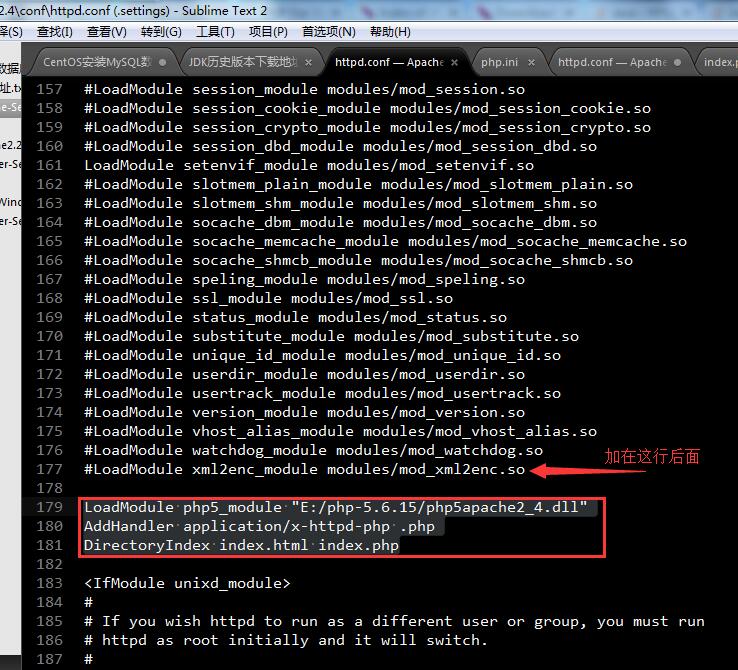
?配置内容如下:
LoadModule php5_module "E:/php-5.6.15/php5apache2_4.dll" AddHandler application/x-httpd-php .php DirectoryIndex index.html index.php
?注意:其中E:/php-5.6.15为我的PHP安装根目录,请对照修改成你自己的PHP实际安装根目录哦!然后你需要重启Apache Server使其生效,如果Apache Server能正常启动则表明OK了.
?
然后你需要安装一款PHP IDE来编写PHP代码,就像你写Java代码需要安装Eclipse是类似的,这里我以Zend Studio为例:
? ? ? Zend Studio 12.5.1-Windows-64安装包下载地址
? ? ? Zend Studio 12.5.1破解补丁及注册码下载地址
Zend Studio如何安装我就不啰嗦了哈,安装完后,请打开它,跟随我一起创建第一个PHP工程来感受下PHP,如图操作: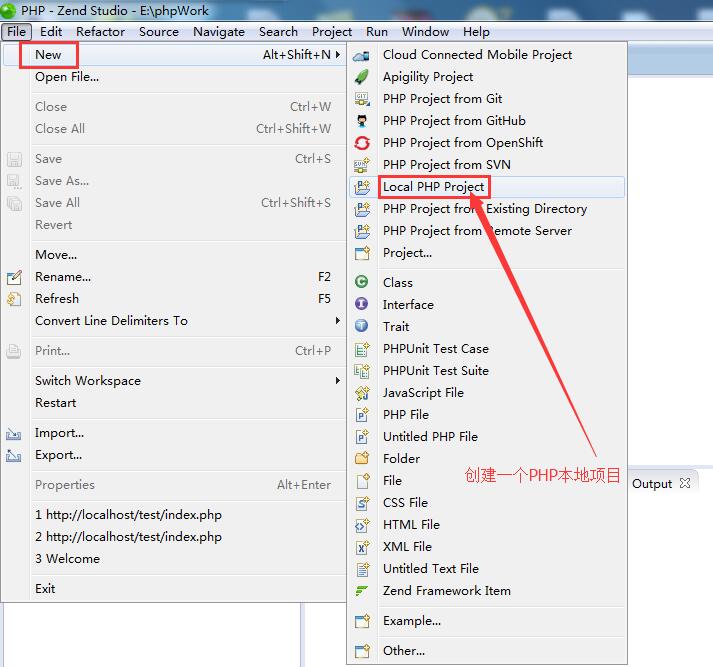
?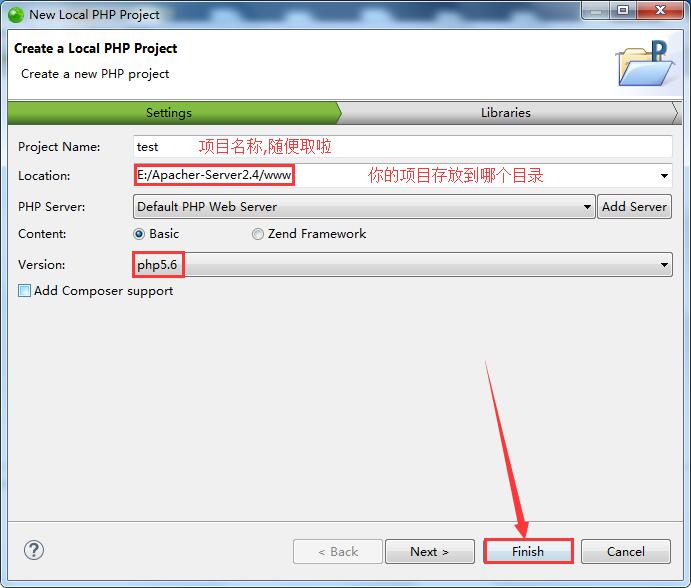
?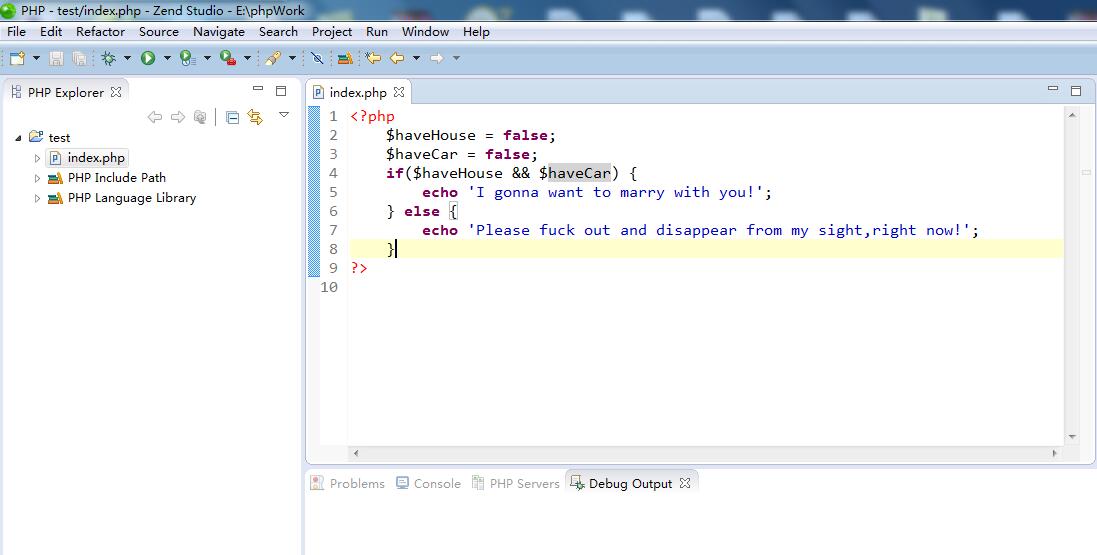
?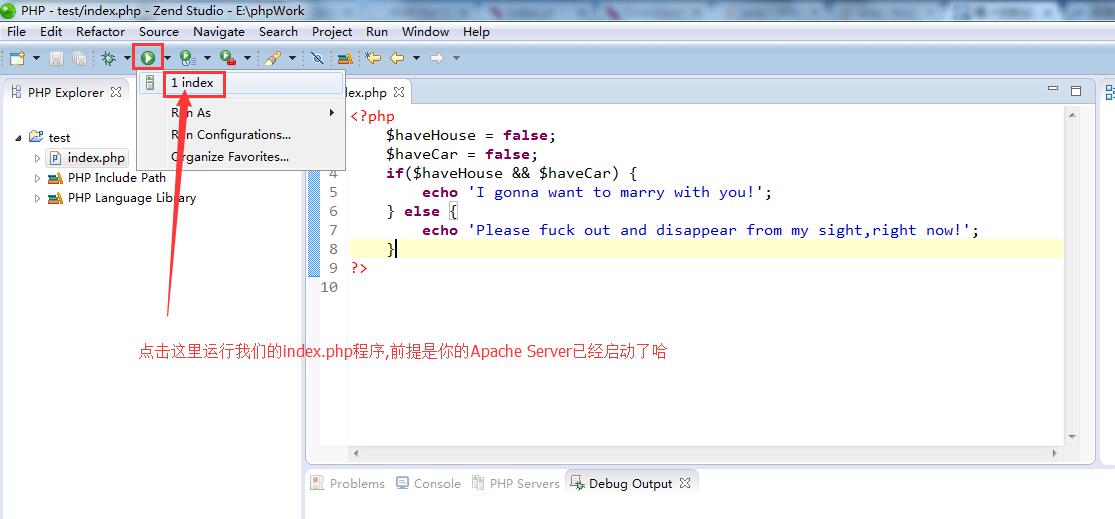
?运行后,你会看到如图的信息,这表明PHP程序正常运行了!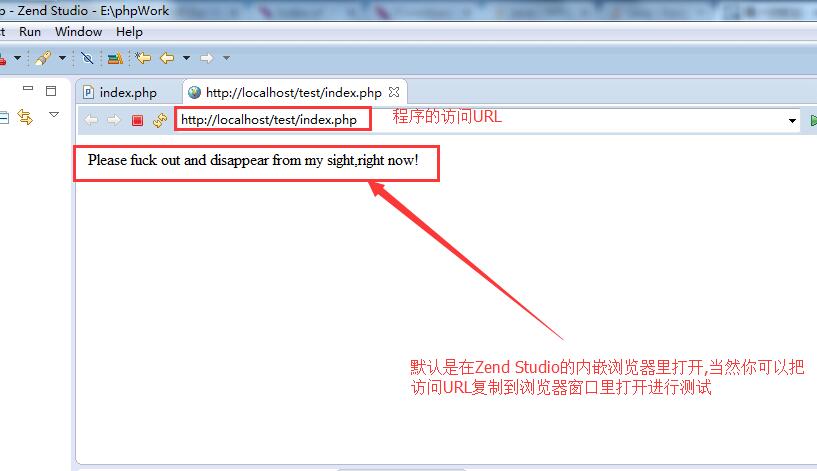
?
? ? ?到此,我们的第一个PHP程序就编写完毕了,更复杂的PHP程序有待我们去学习PHP的各种函数库,慢慢去熟悉咯,不过工欲善其事必先利其器,所以PHP开发环境搭建好了,是万事开始的第一步.
? ? ?可能有些亲就要吐槽了,次奥,这么麻烦,劳资安装一个wampserver,2分钟搞定.我只想说:我不喜欢用傻瓜式的东西,再说采用这种完全自定义的方式去安装,更能学到东西,更能锻炼人.新手如果嫌麻烦,还是请去下载PHP一站式傻瓜安装包吧,望知晓! OK,今天就说到这儿,如果你们过程中碰到各种问题,请QQ咨询我:
? ?(本人QQ:7-3-6-0-3-1-3-0-5)
?